Mentoring while hungry: Grad students face food insecurity
■ Brandeis graduate students elaborate on difficulty affording food, housing, and transportation.
By LIN LIN HUTCHINSON JUSTICE STAFF WRITER
Social justice begins at home, but sometimes it is hardest to see what is in our own backyard.
The food, housing, and transportation insecurity faced by many graduate students is mostly hidden from public view. The driving force behind these issues is financial instability, mainly caused by insufficient stipends and low teaching assistant and teaching fellow wages. The needs of graduate students are far more granular than classes and books.
Graduate students are imperative to the operation of Brandeis University. They teach classes, advise students, conduct world class research, and are involved in an interdisciplinary system unique to Brandeis. Although each of the three graduate schools has different requirements, most graduate students are full-time students in addition to part-time workers for the University. The rigor and time commitment makes it difficult to work
BRIEF
an additional off-campus job to supplement their income. According to Brandeis’ website, the school has over
700 Master’s, PhD, and post-baccalaureate students in over 40 programs.
“We don’t want it to be onerous for students to be able to get what they need — though they may have to articulate something so we know to meet the need — the goal is not to make it bureaucratic or difficult,”
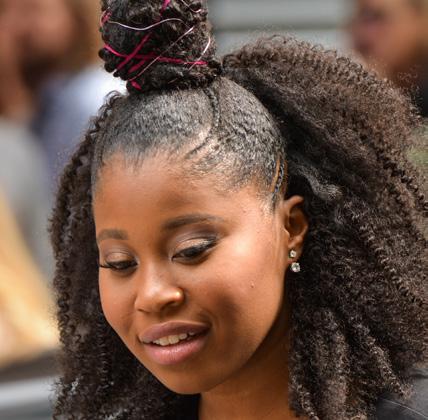
Vice President of Student Affairs Andrea Dine said during an interview with the Justice on April 20.
The overarching issue seems to be that although graduate students are financially compensated, their income is not proportional to the cost of living in the greater Boston area, and therefore, they are not making enough to meet even their basic needs.
Brandeis is reliant on the work of graduate students, but the harsh reality for many students is that they are suffering physically, emotionally, and mentally because they can not get their daily needs met.
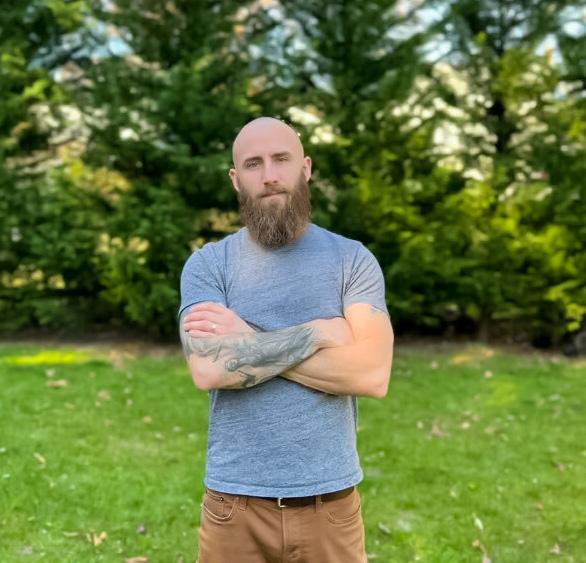
“We are adults,” Olivia Leland, a physics PhD student and graduate department representative, said in an April 26 interview with the Justice.
“We are adults that are making sacrifices for investment that our peers are engaging in, and my needs are not being met.”
See FOOD INSECURITY, 5 ☛
11th annual Lavender Graduation
The Brandeis University Gender and Sexuality Center held their 11th annual Lavender Graduation and Awards Ceremony at the Chris Burden installation “Light of Reason” in front of the Rose Art Museum on May 4.
The Lavender Graduation celebrated LGBTQIA+ graduates and community leaders at Brandeis.
Drag Queen Patty Bourrée was the master of ceremonies for the event.
The Thomas A. King Award was presented to Dr. ChaeRan Freeze (NEJS, WGS) for her service and scholarship as chair of the department of Women’s, Gender, and Sexuality Studies. This award is given to a faculty member embodying LGBTQIA+ allyship, as well as strong engagement with students.
Assistant Director at the Office of Study Abroad Ashley Trebisacci received the Pauli Murray Award for making the experience of studying abroad more accessible to LGBTQIA+ students. This award is presented to an administrator or staff member who demonstrates a commitment to justice and dignity for LGBTQIA+ people.
The Silvia Rivera award is given to a graduate student demonstrating leadership in action. This award was presented to Lisa
Thorn MPP ’23 for her work with intergenerational advocacy.
The Marsha P. Johnson Award is presented to undergraduate students upholding a legacy of service, community, and liberation.
This award was presented to Kyla Speizer ’23 for her activism with Period at ’Deis and Richie Impert ’24 for his activism with VoiceMale.
Rose Peña Ríos ’23 received the Audre Lorde Award for their service as student leader for Triskelion, the University’s oldest LGBTQ+ student-led community. The Audre Lorde Award is presented to a graduate who courageously affirms the dignity of all human beings, including LGBTQ+ people, through language and actions.
Esha Rakesh ’25 received the Leonard Bernstein Award for making a significant difference at the Gender and Sexuality Center as a Pride Representative, specializing in questioning and navigating asexual identities and South Asian-American identity.
This event was supported by the GSC, the Rose Art Museum, the LGBTQ+ Alumni Network, and Student Engagement and Campus Life, and was open for all to attend.
— Anna Martin
Drew Weissman ’81 encourages the class of 2023 to ‘embrace the spirit of perseverance’

■ At its 72nd Commencement Ceremony, Brandeis welcomed a number of accomplished members of the community and outside guests to give remarks to the graduates.
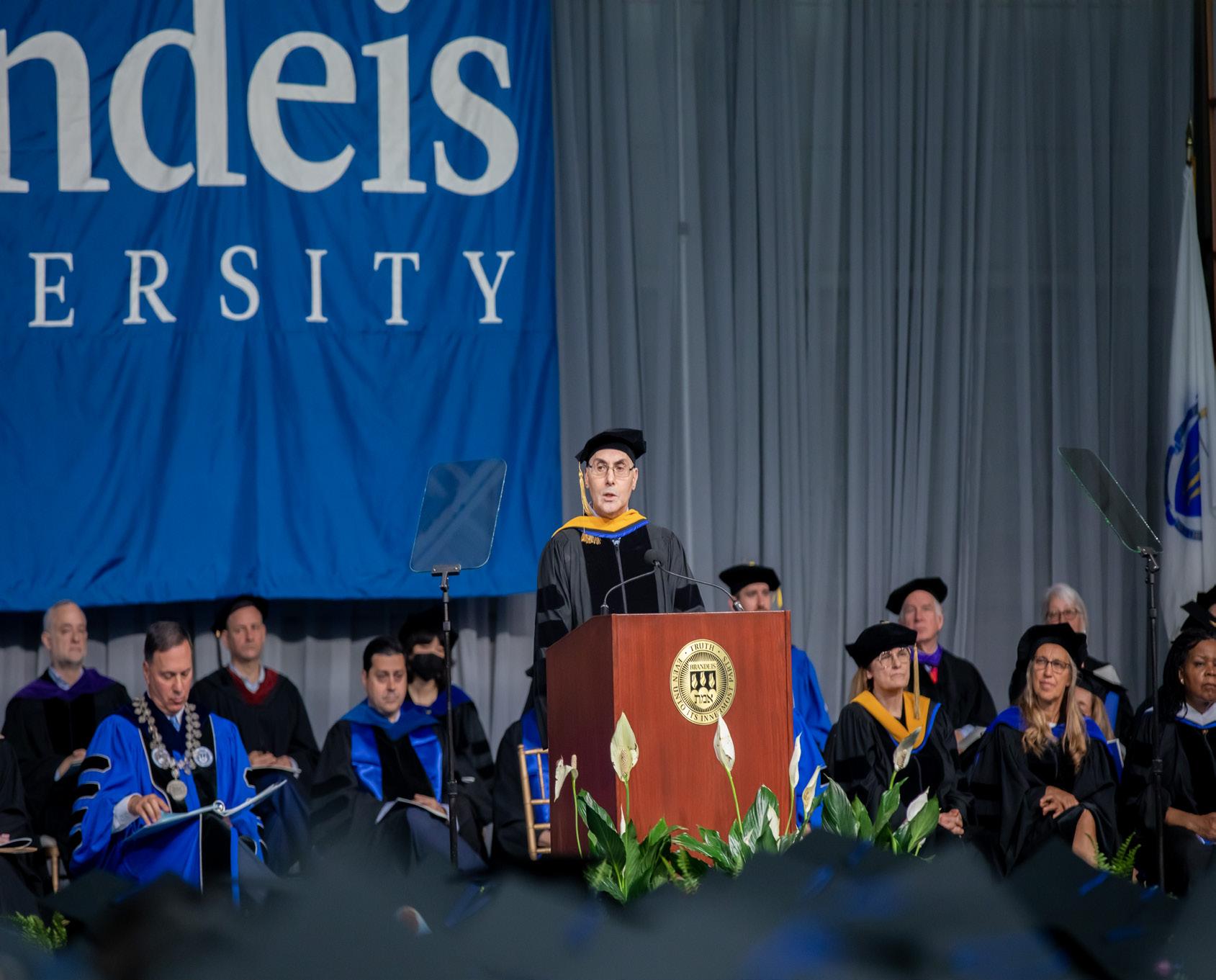 By SOPHIA DE LISI AND ANIKA JAIN JUSTICE EDITORS
By SOPHIA DE LISI AND ANIKA JAIN JUSTICE EDITORS
After years of hard work, lifelong friendships, and unforgettable experiences, the Class of 2023 graduated on May 21 in the Gosman Sports and Convocation Center.
In addition to speeches from various community members, physician Drew Weissman ’81 GSAS MA ’81 P’15 delivered the commencement address. Weissman and biochemist Katalin Karikó received honorary Doctor of Science degrees for their research on the role of messenger RNA in vaccinations and therapeutics. The two worked together to develop their theory despite heavy doubt within their field. Their research ultimately provided the foun-
KENYATTA DAVID
dation for Moderna’s and Pfizer’s COVID-19 vaccines, which have saved countless lives.
In his address, Weissman reflected on how his scientific inquiry blossomed during his undergraduate years at Brandeis. The curiosity instilled in him during that formative time led him to discover the transformative qualities of mRNA. When he and Karikó were met with skepticism in their field, they persevered, leading to groundbreaking progress in vaccinations against COVID-19 and other diseases. He encouraged the graduates to “embrace the spirit of perseverance and never lose sight of the values this institution has instilled in you.”
Weissman also warned against the dangers of misinformation and urged the graduates to keep engaging with people who are against progress, no matter how frustrating it may be. “It is all your responsibilities to lead with compassion and hold those that don’t accountable. As leaders, I Invite you to embrace the remarkable potential of science in whatever you choose to do,” he said.
Along with maintaining a ba-

sic science literacy, the graduates should strive to be “a force for good,” said Weissman. A problem he is particularly passionate about addressing is global disparities in healthcare that prevent access to basic public health.
"Science does not occur in a vacuum. Progress does not happen in isolation,” continued Weissman. “Scientific discovery and human progress is a shared endeavor that thrives on the exchange of ideas, diverse perspectives, and interdisciplinary collaboration.”
He concluded by affirming his faith in the graduates: “Each one of you has the potential to make a profound impact, shape the future, and leave an indelible mark on the world.”
Although the graduates will inevitably face challenges as future leaders, they are capable of overcoming obstacles and succeeding in their goals, a sentiment echoed by undergraduate speaker, Nathalie VieuxGresham GSAS ’23 MS ’23. She approached the podium to her graduating peers as they cheered in support. Vieux-Gresham recalled the “Light
See COMMENCEMENT, 2 ☛
CAYENN LANDAU and NATALIE KAHN
Justicethe www.thejustice.org Volume LXXV, Number 22 Waltham, Mass. For tips or info email editor@thejustice.org Make your voice heard! Submit letters to the editor to letters@thejustice.org COPYRIGHT 2023 FREE AT BRANDEIS. Monday, May 22, 2023 'Swarm': Satire or horror? Kenyatta looks at Amazon's mini-series "Swarm" and analyzes its characters.
T he I ndependen T S T uden T n ew S paper of B rande IS u n I ver SIT y S I nce 1949 Fighting Neo-Nazis As hate group NSC-131 targets marginalized communities across New England, local activists are stepping up.
FEATURES 6-7 Univ. admin and president holds housing listening session By SOPHIA DE LISI and ANIKA JAIN The editorial board recongnizes the Justice's editor class of 2023 By THE EDITORIAL BOARD Brandeis Softball's season ends ahead of NCAA tournament By AIDEN GUTHRO NEWS 3 FORUM 8 SPORTS 12 ARTS AND CULTURE 15 Waltham, Mass. Photo
72nd COMMENCEMENT EXERCISES SMILEY HUYNH/the Justice ADDRESS: Drew Weissman '81 addresses the class of 2023 during his commencement address.
By
By
courtesy of KRIS GOLDSMITH
Photo courtesy of CREATIVE COMMONS
COMMENCEMENT: A bittersweet farewell to the class of 2023
the Night” tradition, in which first-year students write a single-word affirmation on an electric tea candle that represents what they wish to emulate during their studies.
“My word was confidence,” Vieux-Gresham said. She admitted that she still had her candle, and its light reminds her of the graduates’ “resilient, bright, and always shining community.”
Vieux-Gresham explained how she gained this confidence by taking organic chemistry as a first-year.
“The class was hard, nothing stuck, and the truth is, I almost failed,” Vieux-Gresham remembered. “My professor, however, didn’t just tell me to study more. She sat with me, got to know me, saw my potential, and continued to encourage me every step of the way.”
Vieux-Gresham referred to it as a humbling experience, but she said that her professor’s confidence in her enabled her to later defend her master’s thesis in neuroscience.
“We constantly encourage each other to move forward and navigate challenges and hardships one day at a time. We help each other with inclusivity, warmth, and care, and no matter what you do or where you go, you will find a friend in anyone.” Vieux-Gresham fondly recalled how her walk between the Usdan Student Center and the Shapiro Campus Center would take her half an hour to complete because of the number of friends she stopped to speak with.
“We are all so unique and different, but community and confidence unite us,” VieuxGresham added. She explained how her original definition of confidence during Light the Night was a wish to feel confident in herself, her decisions, and her success, but now, it has evolved into a confidence in all of the Brandeis graduates and community. No matter how they define success, she believes that each student will find it.
“The Brandeis community has been and will always be the shining light that has guided us through uncertainty and has impacted each other, those around us, our communities beyond Brandeis, and eventually the world,” she concluded, receiving an enthusiastic standing ovation for her speech.
Director of Hillel and Senior Chaplain Rabbi Seth Winberg also delivered a speech, in which
he encouraged the graduating class to reflect on their education from the University and start thinking about how they can apply it to the world ahead of them. He expressed his high hopes for the class to use their knowledge and experience to improve life for everyone in the U.S. and internationally.
Quinn Lucian Bonnyman ’23 sang the national anthem, accompanied by the live instrumentalists who played throughout the event.
Chair of the Board of Trustees Lisa Kranc ’75 was another featured speaker. She acknowledged the extensive transition that the graduates are facing as they leave the University and continue to the next chapters of their careers.
“There’s some bittersweetness in having to leave a campus that has been your home and place of creativity, stimulation, education, and friendship,” Kranc said.
Like Winberg, she encouraged the graduates to use their new education to benefit the world: “Go out, improve humanity, improve our planet, make a difference, for as we all know, that’s what Brandeis [alumni] do,” Kranc assured. She established that while the graduates will always have a place within the campus, they are also joining a new community of over 60,000 Brandeis alumni around the world. The University’s Alumni Association offers graduates a means to stay connected and involved with the community through events and free career services. Kranc suggested the graduates consider partaking in these events or even becoming a contact at the Hiatt Career Center. She also mentioned that the graduates can come back to campus to join the University’s upcoming 75th-anniversary celebration festivities.
President Ron Liebowitz then offered his congratulations to the graduates and acknowledged the hardships they overcame, starting with the spring semester of their first year when classes went online due to COVID-19.
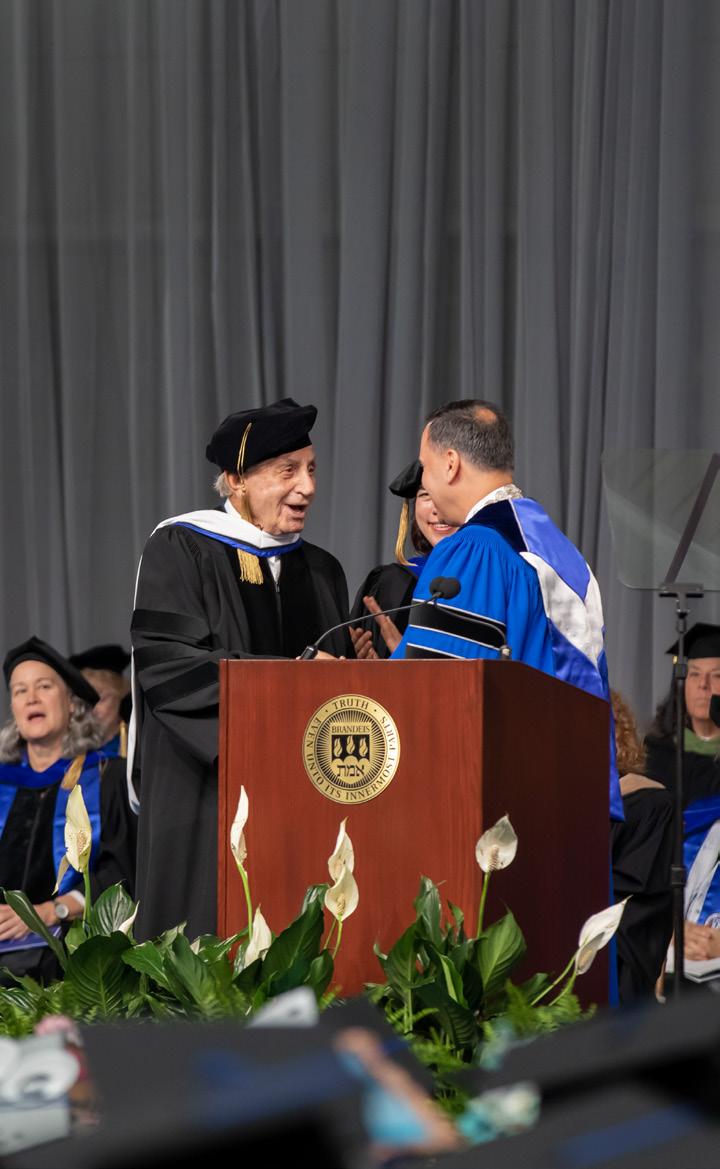
“You adapted and persevered with an openness to new ways of learning and a willingness to go with the flow without knowing when things would return to normal,” Liebowitz commended. “You found ways to come together as a tight-knit community and to support one another, despite harsh restrictions.”
Liebowitz also acknowledged the community’s ability to support one another following the shuttle accident on Nov. 19. The accident
injured 27 — both riders and the driver — and one student tragically died. The student was later identified as Vanessa Mark, an “active and cherished member of the Brandeis community,” according to President Liebowitz.
He added that Mark exemplified what it means to be Brandeisian, because she was “intellectually curious, creative, and giving of her time to help others.” The attendees participated in a moment of silence to honor Mark’s memory.
“Alongside the deep sense of sadness, there has been much love, kindness, and generosity of spirit shown by the community,” Liebowitz said. “So many of you helped your classmates, students, and colleagues by offering your time, or an ear to listen in comfort.” With these examples, Liebowitz said that the graduating class personifies the University’s values, also recognizing their volunteerism and willingness to understand new perspectives.
He also talked about how the class can use these traits to change the world, expanding on issues that need the graduates’ — and the University’s — attention, such as poverty, forms of hate, gun violence, environmental changes, and divisions within national and international politics. Liebowitz expressed that he has no doubts that the graduating class can make real advancements in fixing these problems. Not only have the graduates learned to “think critically and act compassionately,” but their generation also has an “unprecedented” desire to address the world’s challenges, according to Liebowtiz.
“[The community] will be watching with great and abiding interest as you engage the world with the same curiosity and care for others you displayed while on campus. You are Brandeisians which means you follow in the footsteps of so many who have made a difference in our world.”
Liebowitz also presented honorary Doctor of Humane Letters degrees to Harvard University law professor Annette Gordon-Reed and real estate developer Donald Soffer ’54 for their respective humanitarian and philanthropic efforts.
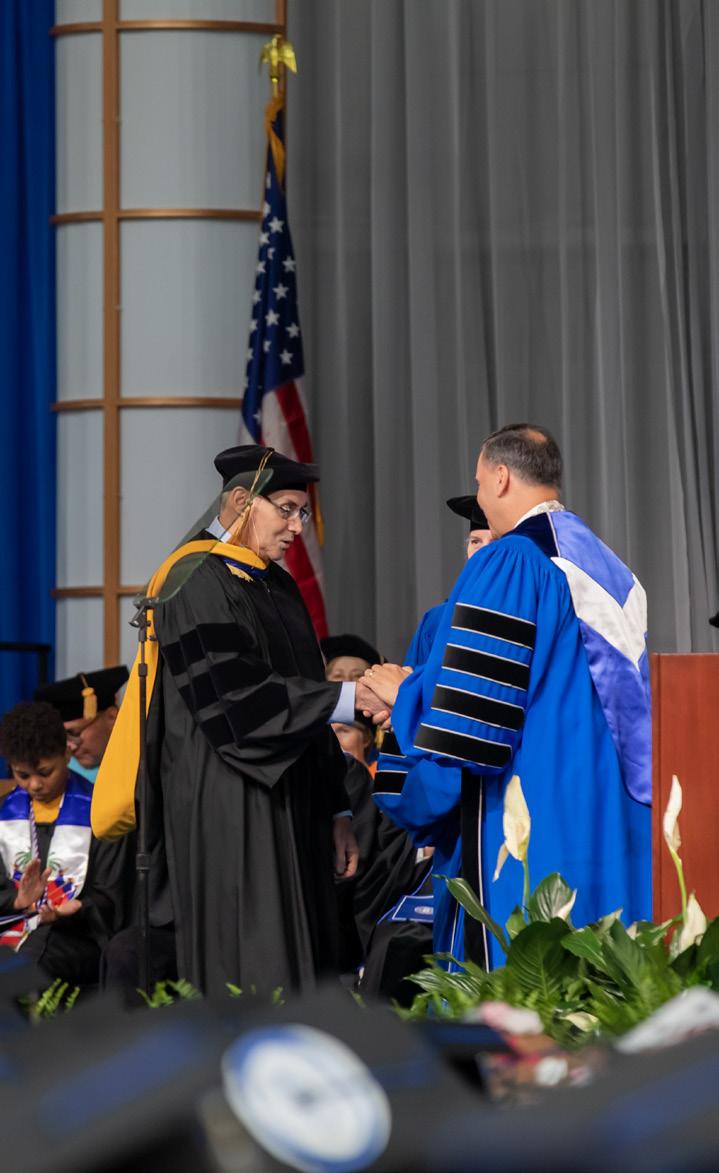
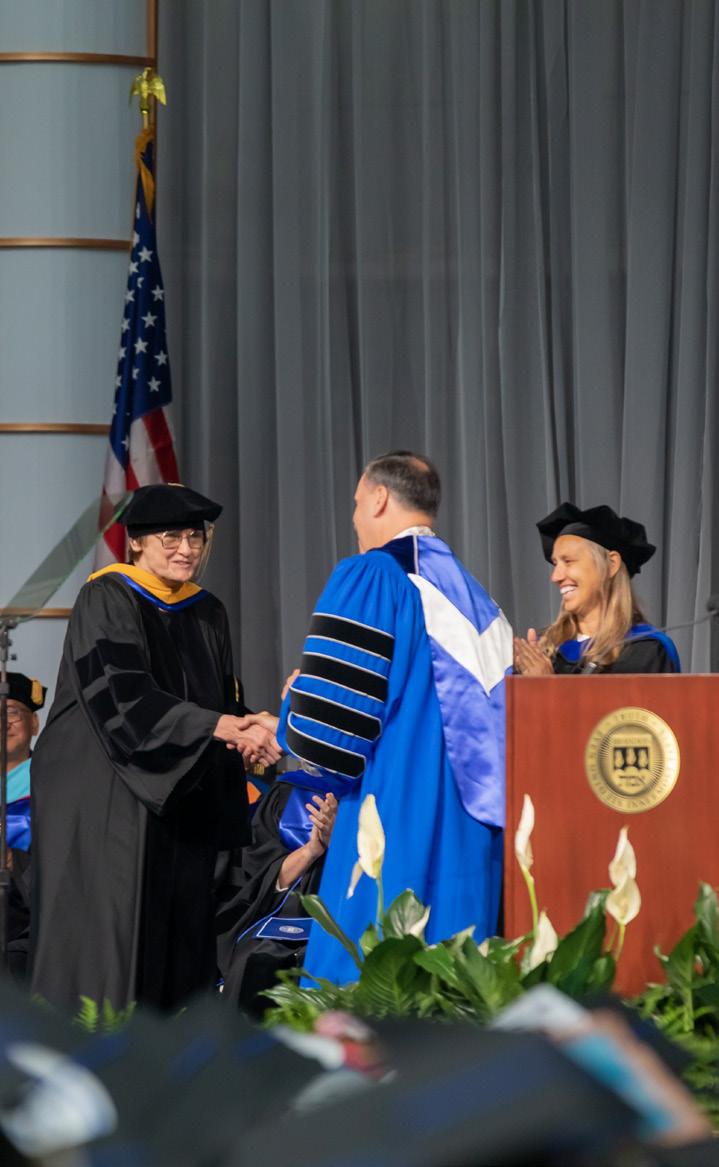
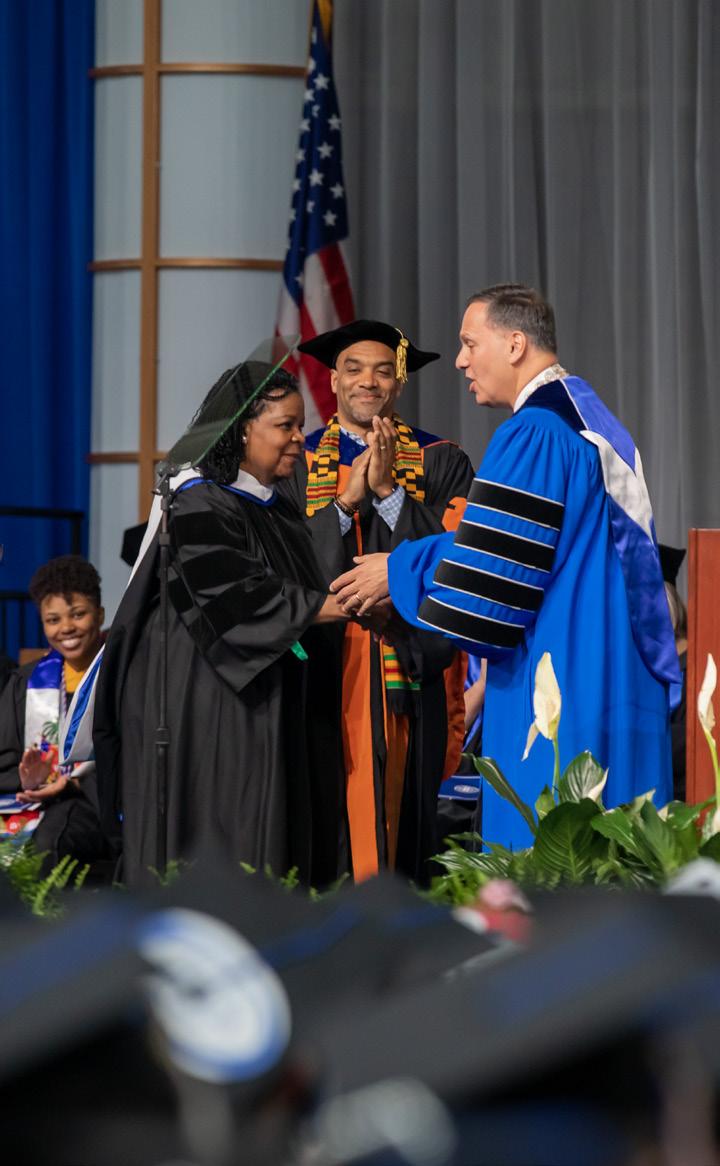
Gordon-Reed is a published author and scholar who has won numerous book prizes for her pieces about Black history which uplift marginalized stories. She delivered the commencement address at the graduate ceremony later that day.
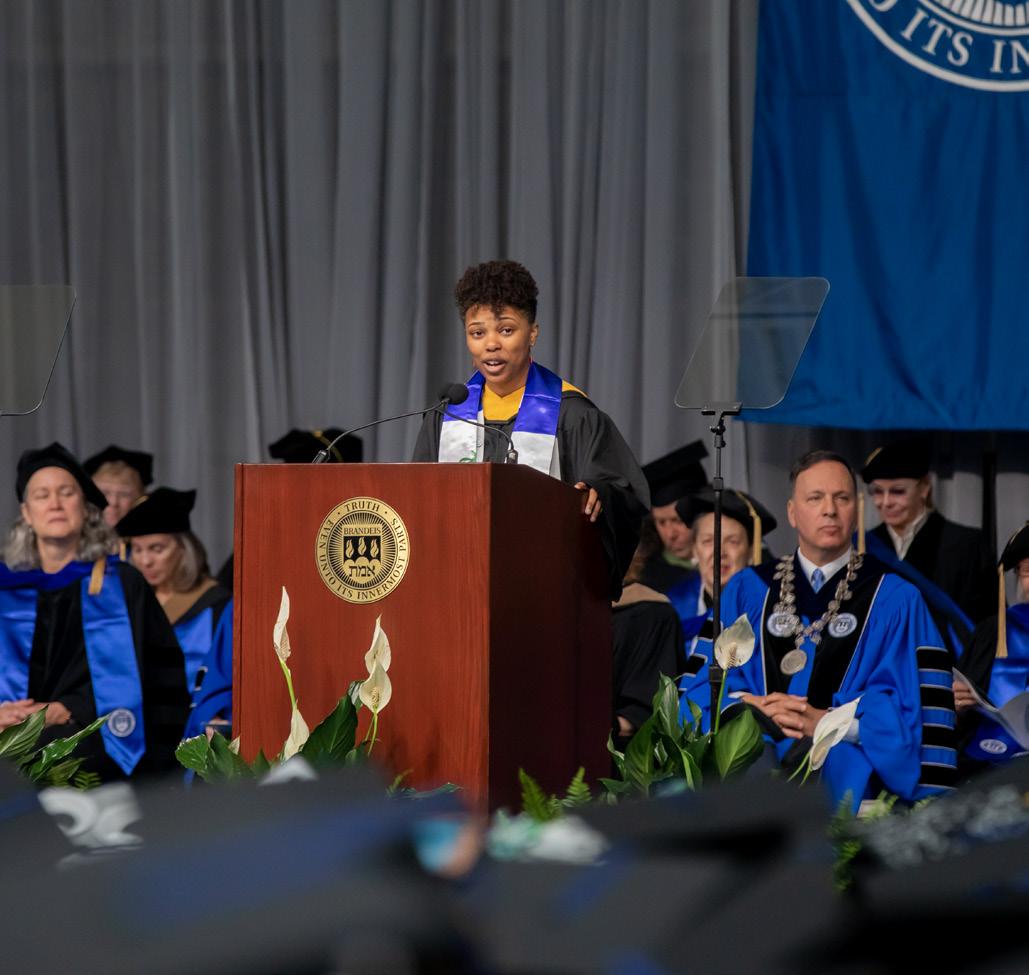
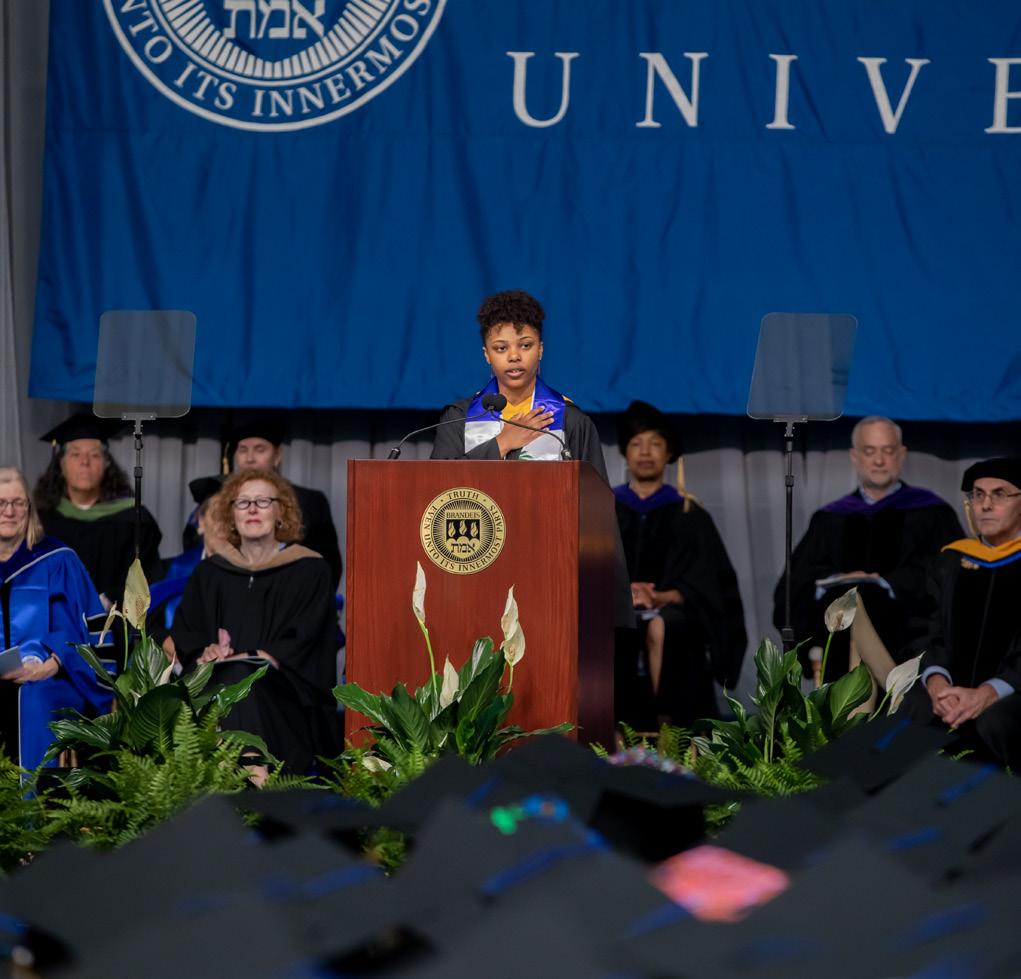
In 1967, Soffer developed Florida’s swampland into what is now known as Aventura, a city that hosts major business centers and strong philanthropic support for higher education. Liebowitz recognized Soffer’s focus on the University, updates to campus facilities, science fellowships, and his role on the board since 1974.
The final remarks came from President of the University’s Alumni Association Lewis H. Brooks ’80, P’16. He fondly reminisced about his four years at the University, stating that the friends he made during that time are still people who he is close to today.
“I love this place,” Brooks said, “and I kept coming back after graduation. I enjoy being here.”
Brooks thanked the University for giving him his fulfilling career and introducing him to new cultures, people, and cuisine. With his experience in mind, he suggested that the new alumni should attend the Alumni Association’s events to stay connected and to wear their “swag” from the University, because it’s impossible to know where and when they will encounter another Brandeis alum.
“You have no idea what possibilities Brandeis will present to you,” Brooks said. For instance, nearly 40 years ago he met a senior in Usdan who he married two years later. In 2012, they moved their daughter onto campus to be a part of the class of 2016. “Thank you, Brandeis,” he said.
“There are over 62,000 Brandeis alumni, our house is a very big house with alums from 1952 to 2023. You can and should reach out … you will never know what doors it will open.” Brooks also suggested the graduates remain in contact with current and prospective students. “I hope you stay connected and keep Brandeis in your hearts and minds forever, and I hope you can say ‘Thank you, Brandeis,’” Brooks concluded. The ceremony wrapped up with a performance of the University’s alma mater, and the graduates received their diplomas. Prof. Jennifer Cleary (THA) was the announcer. Bidding the University a bittersweet farewell, the graduates threw their caps into the air and filed out of Gosman as new Brandeis alumni.
CORRECTIONS AND CLARIFICATIONS
The Justice welcomes submissions for errors that warrant correction or clarification. Send an email to editor@thejustice.org.
Justicethe
www.thejustice.org
The Justice is the independent student newspaper of Brandeis University. The Justice is published every Tuesday of the academic year with the exception of examination and vacation periods.
Editor Managing News Features Forum
Sports Arts Photos
Copy Layout Ads Online
editor@thejustice.org managing@thejustice.org news@thejustice.org features@thejustice.org forum@thejustice.org sports@thejustice.org arts@thejustice.org photos@thejustice.org copy@thejustice.org layout@thejustice.org ads@thejustice.org online@thejustice.org
The Justice Brandeis University Mailstop 214 P.O. Box 549110 Waltham, MA 02454-9110 Phone: (781) 736-3750
The Managing Editor holds office hours on Mondays from 7:30 to 8:30 p.m.
2 MONDAY, MAY 22, 2023 ● NEWS ● THE JUSTICE
CONTINUED FROM 1
CLASS SPEAKER: Natalie Vieux-Gresham ’23 addresses her fellow
HONORED: University President Ron Liebowitz shakes hands with this year’s honorary degree recipients, Annette Gordon-Reed, Katalin Karikó, Drew Weissman ’81, GSAS MA’81, P’15, and Donald “Don” M. Soffer ’54.
graduates.
SMILEY HUYNH/the Justice
SMILEY HUYNH/the
Justice
President Liebowitz and Univ. admin hold listening session to provide a forum about housing concerns
■ Students raised questions to President Liebowitz and other administrators about housing options.
By ARIELLA WEISS AND AMANDA CHEN JUSTICE SENIOR EDITOR AND JUSTICE SENIOR WRITER
It was Brandeis students’ last day of classes on May 3, and University administrators held a listening session addressing student housing concerns. The session took place in Goldfarb Library’s Rapaporte Treasure Hall at 1:30 p.m.
In addition to President Ron Liebowitz who hosted the discussion, Vice President for Campus Operations Lois Stanley; Vice President of Student Affairs Andrea Dine; Assistant Vice President of Student Financial Services Sherri Avery; and Associate Vice President of Student Affairs Shelby Harris helped answer students’ questions. Vice President of Diversity, Equity, and Inclusion Lee Bitsóí took notes on a whiteboard behind him, and Director of DEI Education and Learning Initiatives Dr. Charles Chip Mc Neal moderated the session.
After an introduction by Mc Neal, Liebowitz addressed the audience. He acknowledged that the class of 2026’s size is unprecedented and that the University “yielded” 76 more students in the class of 2026 than they expected. Liebowtiz also said the University has “no plans to grow” its student body.
In the fall 2023 term, 75 to 80% of students will be living on campus, Dine said.
Liebowitz stated that there are 2,800 beds total. He added that Brandeis “has always had a shortage of beds and expected students to live off campus.” In previous years, he said, students who got housing dropped out, freeing up space on the waitlist. He said he expects students to do the same this year.
A student asked if there were projects “down the pipeline” for new on-campus housing. Stanley said that in the 2021-22 academic year, her office did a “housing program study” on what “the next 20 years of renovation” would look like for Brandeis, but there are no plans in the immediate future to begin new construction.
Many students asked if the administration was looking into emergency housing. Liebow-
POLICE LOG
MEDICAL EMERGENCY
Apr. 30 A caller reported an intoxicated subject at Foster Mods. BEMCo and Armstrong Ambulance responded to the scene, and the patient was transported to a local hospital via ambulance.
Apr. 30—A caller requested medical assistance for a semi-conscious, intoxicated party. The patient was assessed by BEMCo staff and refused medical treatment.
Apr. 30—The area coordinator on call stated that another party had reported an intoxicated party. BEMCo was dispatched, and the patient was transported to a local hospital via ambulance.
Apr. 30—There was an intoxicated party by the bookstore. Waltham Police, Waltham Fire Department, and Armstrong Ambulance arrived on the scene. The patient refused medical treatment and was allowed to walk home with assistance from friends.
Apr. 30—A party reported that an intoxicated party hit their head. BEMCo was dispatched to assess the patient. The patient refused medical treatment.
May 1—A caller reported that a worker’s foot was run over while packing up event materials. BEMCo was notified and responded to the scene. The patient refused transport and medical treatment.
May 1—BEMCo requested an ambulance to transport a party who suffered an ankle injury the prior day. The party was transported to Massachusetts General Hospital via ambulance.
May 2—A community member called BEMCo for medical assistance. The party was treated by BEMCo and refused further medical aid.
May 3—A reporting party requested Armstrong Ambulance for a party who hit their head. Armstrong Ambulance was dispatched and transported the party to Newton Wellesley hospital via ambulance.
May 3—A reporting party requested BEMCo for a party who fainted. An officer requested Armstrong Ambulance. The patient refused medical treatment and signed a patient refusal.
May 3—A party reported that they sprained their ankle on the Rabb steps. The patient
itz and Dine stated that they were negotiating with various partners to find more solutions, but they did not offer any details on who they were speaking with or how soon they would be able to announce new housing options.
The University expected more students to live off-campus prior to the housing selection. This plan may contradict the City of Waltham. At the session, a student raised a concern about a recent Waltham City Council resolution called “Preserving Residentially Zoned Neighborhoods.” The resolution, if enforced, would displace those who don’t fit into the “single family home” category, such as students, from parts of Waltham. Stanley said she was unaware of the resolution.
One student asked if the University would be open to using their endowment to fund emergency housing alternatives. “It’s a tricky thing,” Dine said. “The endowment … is able long-term to provide more funding for the entire institution. So, in general the goal is not to tap [into it].”
Students were worried about losing financial assistance due to living off campus, but Avery stated that off-campus students can still receive financial aid during the nine month period from September to May. On average, it is cheaper to live off campus than on campus, according to Avery. She estimated that it costs $12,000 per year to live off campus, with rent and utilities combined costing $941 per month, and food costing $390 per month. The estimate of $12,000 was calculated based on undergraduates’ leases during the 2022-2023 academic year. On the other hand, the estimated cost to live on campus is $19,000, which covers the costs of housing and an all-access meal plan.
However, students pointed out that while off-campus housing may be cheaper in the long run, students face steeper upfront costs such as the first and last month’s rent and security deposits. The financial aid timeline does not align well with the Brandeis housing selection process, and because of increased competition, any delay in receiving financial aid or updates on alternative housing could cause someone to lose out on signing a lease off-campus.
If students’ financial aid exceeds the cost of tuition and fees, they will receive a refund that they can use to pay off campus housing
refused further medical treatment.
May 5—A patient was transported to Newton Wellesley Hospital via Lyft. The area coordinator on call was notified.
May 5—A party reported that a friend was having an allergic reaction, and an EpiPen had been administered. BEMCo was dispatched and assessed the patient. The patient was transported to the hospital. The area coordinator on call was notified.
May 5—A reporting party stated that a subject injured their knee. BEMCo, Armstrong Ambulance, and Waltham Fire Department responded to the scene. The patient was transported to the hospital for further treatment and observation. The area coordinator on call was notified.
May 6—BEMCo responded to Hassenfeld parking lot to assist an intoxicated subject. The patient was transported to the hospital via ambulance.
May 6 BEMCo responded to East Quad to assist an intoxicated subject. The patient was transported to the hospital via ambulance.
May 6—BEMCo responded to North Quad to assist an intoxicated subject. Armstrong Ambulance was requested and responded to the scene. The patient was evaluated and refused further medical attention.
May 6—A party reported a stomach bug and requested BEMCo. The patient refused further medical treatment.
May 7—Units responded to Massell Quad to investigate a report of an intoxicated party. An officer and BEMCo were dispatched. The party was evaluated by BEMCo and signed a refusal form. Shortly after, the units were called back, and the party was re-evaluated and signed a second refusal form for further medical treatment.
May 7—BEMCo responded to North Quad to assist an intoxicated party who was vomiting. Armstrong Ambulance was dispatched, and the patient was transported to the hospital.
May 8—A medical call was made for an injured Brandeis employee. The patient was transported to a local hospital.
May 9—A medical call was made for a student with severe body cramps. The patient refused
costs. However, regulations state that the University cannot give a refund taken out from next school year’s financial aid for fall until 10 days before the start of the fall semester.
Avery acknowledged that this would make it difficult for students to pay first and last month’s rent during the summer. The Office of Student Financial Services is willing to write letters to landlords confirming that rent will be paid but at a later date. Whether or not a letter would suffice is up to the landlord.
If students pursuing off campus housing incur costs greater than $12,000, they can start an appeal process with the proper documentation to receive more funds from the University. Students can tap into funds of up to $7,000, which is the gap between the price of on-campus and off-campus housing. However, every situation is unique and Avery recommended students talk with their financial aid counselors.
Using emergency funds to cover rent is also not an option because rent is included in the cost of attendance for financial aid. Brandeis’ policy is to meet 100% of demonstrated financial need, so rent is covered and emergency funds cannot be used for this situation.
Another student asked why not all students who had received accommodations for housing received a housing option that met their accommodations. “Juniors and seniors … are not guaranteed housing here [with an accommodation] ... The keyword [is] available accommodations.” Harris said. “We cannot make [housing] stock that doesn’t exist.” She added the University would work on messaging to students to make that clearer.
Other suggestions for improving the housing selection process included shifting the process to earlier in the semester so that students who cannot obtain on campus housing can start searching off campus earlier. Moreover, students pushed the Department of Community Living to utilize their data on roommate groups and selection times to determine how many students could receive on campus housing. Dine agreed that the administration should use data to increase transparency, make the housing process earlier, and avoid stacking deadlines.
Aliza Fine ’25 pointed out that the decision to waive the fee for staying on the housing
further medical treatment.
May 12—An individual fell off their skateboard. The patient refused medical treatment.
May 15—A medical call was made for an intoxicated student. The patient was treated by BEMCo and refused further medical care.
May 17—There was a medical emergency for a leg injury. The patient was transported to a local hospital.
May 18—A caller reported an intoxicated party needing assistance. BEMCo, Waltham Fire Department, and Armstrong Ambulance responded after being notified. The patient was transported to a local hospital via ambulance.
May 18—There was a medical emergency for a leg injury. The patient was transported to the hospital via ambulance.
May 18—There was a medical emergency for a leg injury. The patient refused medical treatment.
ACCIDENTS
Apr. 30—There was a minor multiple vehicle accident without injuries.
May 2—A caller reported that their vehicle was struck. There were no injuries.
May 15—An officer reported that they struck a yellow pole while backing up. The officer reported damage to the rear passenger side bumper. There were no injuries.
NOISE COMPLAINTS
May 9—A party reported a loud neighbor. The area coordinator on call was notified to respond.
May 9—The earlier party reported their neighbor being loud again. An officer stood by while the area coordinator on call handled the complaint.
May 10—A party reported their neighbor being loud. The area coordinator on call was notified to respond.
May 12—Units responded to the Charles River Apartments to investigate a report from a concerned neighbor about loud music. The area coordinator on call was notified. Both parties were advised, and a verbal warning was issued.
May 14—A party reported people being “loud.”
waitlist for too long came too late. Students had already left the waiting list because they were afraid of forgetting and incurring a fee. According to a Justice phone communication with DCL on May 9, students can email DCL to re-enter the waitlist.
Concluding the listening session, Dine said students who still have questions should “feel free to email Student Affairs.” In an April 28 email to faculty, Provost and Executive Vice President for Academic Affairs Carol Fierke asked professors to advise students with housing concerns to contact the Offices of Student Affairs and Student Financial Services.
After the listening session concluded, the Justice spoke with Natasha Girshin ’25, who commented that the administration’s responses were vague and uninformed. Girshin said that the administration did not seem to care about students’ welfare.
A week following the listening session, students are still waiting to hear from the University on next steps. A student asked at the listening session if there was a guarantee that those on the waiting list would receive housing. Liebowitz said he could not answer that question at that time. Later in the session he added, “I am confident that we will find a way to get housing for all the students that need it.”
Even though the University is creating spaces for students to express their concerns and has assured students that they are working on a solution, students have no set date from the University on University-provided alternative housing and will have to find their own housing off-campus in the meantime.
Daphne Ballesteros ’24 is one of those students. She emphasized how Brandeis’ housing crisis has disproportionately impacted low-income students like herself. “I will be homeless next year … this is terrifying,” she said. She highlighted Brandeis’ history as a social justice University committed to helping marginalized communities, but argued that their response to the housing crisis does not reflect the University’s mission. She urged the administration working on solutions to consider the very communities that the University was established to help.
The reporting party could not tell if the people were inside or outside the building. The area coordinator on call was notified to respond.
MISCELLANEOUS
May 3—A party reported harassment by email. The case is under investigation.
May 5—A party reported a roommate causing disturbance. Community Living was notified to respond.
May 5—A party reported a verbal altercation between the parties involved in the earlier call. All appears in order.
May 10—Waltham Police Department reported an indecent assault and battery that occurred off campus. The case is under investigation.
May 11—A party reported receiving a disturbing phone call. The case is under investigation.
May 11—There was a report of harassment by email. The case is under investigation.
May 12—There was a bomb threat. The case is under investigation.
May 13—A party came to the station to dispute some parking tickets. The supervisor was notified by the Parking Office due to the party’s disruptive behavior. The case is under investigation.
May 16—A party reported their headphones were in the lost and found and someone else took them.
May 16—A party reported that someone was in their room and a friend’s room and items were moved and taken. The case is under investigation.
May 17—An area coordinator on call reported a Class D violation during room inspection. The office in charge was notified.
May 18—There were reports of a party being scammed by a landlord. The case is under investigation.
— Compiled by Sophia De Lisi and Anika Jain
THE JUSTICE ● NEWS ● MONDAY, MAY 22, 2023 3 Write an op-ed for
the Justice



In fall of 2022, the Brandeis Graduate Student Association sent a survey to the entire graduate student population to better understand students’ experiences with finding housing and the cost of rent. A copy of the survey report was provided to the Justice by a graduate student. 363 graduate students responded to the survey, nearly 52% of Brandeis’ graduate student body. 80% of the survey respondents shared their total income, with the median yearly income being $24,500. The majority of students said their main source of income was Brandeis stipends or other on campus employment. In a separate survey sent out by the Brandeis Office of Student Affairs on March 24, one respondent wrote that due to the cost of living in the Boston metro area being higher than the national average, the stipend package given to them would be just enough to cover basic essential expenses. According to the graduate schools’ website, stipends may range from $21,000 to $36,000 a year depending on the department. This figure does not account the amount paid in annual taxes. With this salary, many students are only able to afford the bare minimum.
In 2004, the Massachusetts Institute of Technology developed the Living Wage Calculator, a tool to help individuals understand and estimate the wage rate required to live anywhere in the country. The calculator projects that to live in Middlesex County, Massachusetts, a living wage for a full time working individual is $23.45 an hour or $48,776 a year. According to the calculator, $4,559 is estimated to be how much is needed for food and $20,920 for housing yearly. Given these estimates, it is understandable why graduates are dissatisfied with their fixed stipend. These stipends do not take into account inflation rates or the current cost of living.
The wages that TA and TF graduate students receive are currently set in the 2021-2024 contract established by the Graduate Student Union. Since the current wage doesn’t meet the current cost of living, there have been ongoing discussions.
“The union can support and empathize and fight, but we do not have that much bargaining power, unfortunately. This is because of the compromises that were made by the initial group of students who were fighting for unionization,” said Sanchita Dasgupta, a union representative and PhD student in sociology. “We have tried and failed every time. In fact, this is a huge problem for the admissions committee of different departments for the PhD programs, because we are not able to attract top talent because our pay is so low as compared to other schools in the Boston area and around the U.S.”
International students carry additional financial burdens. Valerie Bettaque, a PhD student studying mathematics, is an international student with an F1 Visa. Since Bettaque doesn’t have residency status, she is not eligible for tax deductions. Given that tax withholdings are higher for international students than domestic students, she faces an additional burden of food insecurity.
Food insecurity has grown exponentially as a problem since the pandemic according to Forbes. Since 40% of U.S. college students currently face food insecurity, the need to combat the issue is paramount.
For third year PhD candidate Ian Murphy, if he had to live on the income solely provided by the University, the location and cost of housing would be his biggest concern. He explained that he is fortunate enough to have a
Graduate students struggles to make ends meet
partner that brings in additional income. “If I had to live off of my own salary while paying Waltham rent, I don’t know what kind of situation I would be in,” Murphy said. Despite Murphy being in a dual income household, he still highlights the problems associated with the low compensation of graduate students, acknowledging that this would impact his food intake. Murphy continued that he would have to look more carefully at what groceries he could afford, and this limited budget could lead to eating cheaper and more processed foods, increasing the risk of malnutrition. Having to choose between their budget and the quality of their food is the reality for many graduate students.
The paralyzing feeling of receiving an unexpected bill that determines whether or not one will go hungry can cause great emotional, mental, and physical tolls.
Lewland explained that she was in the exact predicament that Murphy describes. During her first year of graduate school, she had an emergency that caused her to have a “complete nervous breakdown.” After the crisis she was left with nothing but $150 in her bank account and was forced to decide between feeding herself or her cat. Luckily, Leland had a friend that sent her money to help cover expenses for the following couple weeks.
“I honestly do not know what I would have done if my friend didn’t do that for me. I probably would have opted to feed my cat,” Leland said. “But the emergency happened mid-semester, when I was still teaching and in classes. I doubt I would have been able to perform either effectively if I skipped groceries for the week.”
This is the all-too-familiar reality for many graduate students at Brandeis and around the country. In 2020, at the beginning of the pandemic, a study conducted by the National Library of Medicine at a university in the northeastern region of the U.S. with 263 graduate student participants concluded that the reality of food insecurity as it relates to mental health problems should be addressed head on: “Food insecurity occurred in nearly half of the graduate students surveyed, and very low food security was associated with elevated levels of depression, anxiety, and stress.”
Graduate students’ financial uneasiness is exacerbated by the high cost of living in the greater Boston area as compared to the national average. According to Payscale, the cost of living in Waltham is 44% higher than the national average and 50% higher for Boston. Individuals who face food insecurity often face additional financial challenges like housing and transportation issues. Since Brandeis does not offer graduate students on-campus housing, they are left to find alternative housing. Many students who are not in a dual income household or who do not have other financial support may have no other choice but to secure roommates in housing often far from campus.
In addition, Brandeis transportation services are limited to a specific area. Due to the high cost of living, many students live further away from the campus and may not be able to access the current free services and have to find alternative transportation. The cost of additional needed transportation can amount to a significant portion of the student’s income.
An anonymous survey responder to the Student Life Survey sent out by the Department of Student Affairs expressed their fears and frustrations at what they see as misplaced University priorities.
“I am one crisis away from crushing financial debt — a health scare or a car accident could put me into crushing debt,” the graduate student writes. “As a graduate worker and
a TA, my labor is essential for Brandeis to run. It is morally wrong for the Trustees to budget millions of dollars to pay the salaries of administrators like Ron Liebowitz while graduate workers like myself are so financially precarious.”
Dine acknowledges her department is aware of graduate students’ concerns. She pointed to the Student Life Survey, developed in partnership with members of the Board of Trustees and other stakeholders, that reflected dining as a top issue for graduate students. Housing and transportation were ranked fifth and seventh respectively. Dine made a point to outline the existing food options. F.R.E.S.H, a food pantry program created by the Office of Graduate Affairs and partnered with Healthy Waltham provides students with non-perishable food resources and hygiene products. Additionally, there is a partnership with Warner Farms Vegetable Donation, where every week only 10 students can reserve 1-2 pounds of fresh produce. This year the University has collaborated with Swipe Out Hunger, a program that allows for undergraduate students to donate extra guest meal swipes, and graduate students can apply for those donated meal swipes. Students expressed hesitancy to apply, as the website stated applying for meal swipes could have an impact on financial aid. Assistant Vice President of Student Financial Services Sherri Avery has confirmed that last year her office determined students will not be required to report received meals, and it will not affect their financial aid per an April 27 email to the Justice. After the Justice contacted the department, the administration changed the website to reflect this policy. In acknowledging graduate student concerns, Dine explained that part of the plan for the Shapiro Campus Center enhancement project is to incorporate refrigeration and other food insecurity resources.
Dine also stated that there is a plan to look at transportation routes in relation to existing food pantries and organizations like Healthy Waltham Food Distributions.
Despite University efforts, graduate students still face extreme financial hardships as outlined above, and the current solutions don’t adequately address the students’ needs. Good intentions alone have not solved the problems. Some have called these efforts on the part of the University “band-aid” solutions, while others question their effectiveness entirely.
Graduate students report that they are looking for healthy, affordable grab-and-go food on campus. This is not currently happening in a way that sufficiently meets their needs, evidenced by student survey responses. In an April 24 email to the Justice, a member of the Office of Graduate Affairs, who wishes to remain anonymous, wrote: “The Office of Graduate Affairs is very concerned about food insecurity.” Many graduate students who rely on the food pantry have expressed the desire for more fresh and prepared foods that are more filling and nutritious. That member of the Office of Graduate Affairs acknowledges the problem and calls on the school to do more.
“We are what we eat, and the food pantry does not provide enough options for students to have a healthy meal,” the representative wrote in the April 24 email.
In what seems to some to be a piecemeal approach, rather than a holistic model, the University has also offered financial literacy resources for graduate students.
“You can’t budget your way out of poverty,” Leland said. “You can’t budget your way out of unperceived medical situations.”
Many graduate students shared their frustration with the fact that the University knows
their financial situation, and rather than providing a living wage, their answer is financial literacy courses and food pantries.
Similarly, the Brandeis Office of Student Affairs, last month, published a website hoping to help all students find nearby housing. Dine elaborated that this may be more helpful for international graduate students who fall victim to housing scams. The administration hopes to adjust the website to make it more helpful for graduate students. If graduate students are not making a livable wage, as evidenced by the MIT calculator, a resource like this proves to be limiting.
Financial necessities fostering mental and physical health often come last, but Bettaque, who is in the process of transitioning, deems her hair removal treatment an absolute necessity. She expressed that the primary financial impact for her is that her transitional care is expensive. Her hair contributes to her gender dysphoria and with Brandeis’ health insurance, Bettaque has to pay out of pocket, meaning money is not there for other basic needs like food.
“Still, it has had a significant beneficial impact on my mental health, so I don’t regret it,” Bettaque said.
A 2022 study titled “Food insecurity and mental health among young adult college students in the United States” examined the health and wellness among undergraduate and graduate students in the U.S. to better understand the association between food insecurity and mental health. The study concluded that “food insecurity was associated with greater prevalence of depression, anxiety, languishing, perceived need for help, loneliness, and self-injurious behaviors.”
“For a school that is pushing for social justice we are lacking in access to fresh, affordable foods and having a stable food pantry,” wrote the representative from the Office of Graduate Affairs.
As stated on the University website, “Brandeis was founded in 1948 … to embody its highest ethical and cultural values … The university that carries the name of the justice who stood for the rights of individuals must be distinguished by academic excellence, by truth pursued wherever it may lead and by awareness of the power and responsibilities that come with knowledge … and to recognize the need to analyze and address the ways in which social, cultural and economic inequalities affect power and privilege in the larger society and at Brandeis itself.”
“It’s very hard to provide quality education, teaching, and mentorship to undergrads, which I want to do, which I’m expected to do, but I can’t if I’m so stressed and don’t know when I’m going to eat,” Leland said.
In evaluating the stated concerns in relation to the resources it seems there are still many outstanding steps that need to be taken for a comprehensive approach to addressing financial, food, housing, and transportation insecurity for the Brandeis graduate student population. In interviewing graduate students for this story, each highlighted a need for the following actions: responsiveness from the administration when students express concerns, union contract negotiations prior to the end of the current contract, adjusted stipends to meet or exceed a living wage for the area — on campus graduate housing and funding for transportation to name a few. Consideration of a holistic approach to address the financial insecurity concerns is paramount as expressed by graduate students at Brandeis.
Student Union swears in the new president and vice president
sentative, had class. She also said that students should fill in the feedback forms that occasionally arrive in their emails. Without these, Gilani said, the representatives are unable to provide quantitative data to the administration about students’ concerns.
By MAX FEIGELSON JUSTICE SENIOR WRITER
The Student Union hosted its semesterly State of the Union event on May 1, at which outgoing President Peyton Gillespie ’25 swore in new President Noah Risley ’24 and new Vice President Erica Hwang ’25. Director of Community Engagement Emma Fiesinger ’23 also gave out several awards to Union members who had served for multiple years.
Beginning with Gillespie, members of the Executive Board gave brief speeches on their work from this past year. He recapped the Union’s work with Period Activists at ’Deis to get free menstrual products for the bathrooms around campus, an effort which is still ongoing.
Gillespie also acknowledged the lack of sufficient student housing and questioned the administration’s decision to build a new science building, which he said would cost $145,000,000, rather than new dormitories.” As students, we feel that our voices are either ignored or neglected on a campus which is our home,” Gillespie said. “[We] must remember that one of the most powerful tools available to us is our ability to remain unified to make our voices heard.”
Senior Representative to the Board of Trustees Inaara Gilani ’23 said in her speech that her work focused on bringing up student issues to the board of trustees. Gilani said this job was made more challenging by the trustees’ decision to host meetings when she and Shelley Polanco ’24, the junior repre-
Rani Balakrishna ’25, the undergraduate diversity and inclusion officer, spoke briefly about the ongoing issues with the softball field, which she said was a Title IX violation. She said that even though the administration is aware of these issues, they have not yet acted.
Gillespie read the speech of former Director of Accessibility Hana Miller ’25, who recently resigned. In her speech, Miller highlighted the work she did this semester, including getting the funds for a ramp to the Brandeis Counseling Center and starting the Capsule project, which would make it easier for students to have their prescriptions delivered on campus.
“My overarching goal here has been to make accessibility part of the conversation, to make it something [the administration] cannot continue to ignore,” Miller wrote in her speech. “Together, we are realizing the power of our collective voices.”
Gillespie read the speech of co-chairs of the Allocations Board Lexi Lazar ’24 and Elisha Gordon ’25, who were unable to attend. Lazar and Gordon wrote that they hosted several “town halls” this semester to help club leaders request funding from the Allocations Board.
Former Vice President Nicholas Kanan ’23 spoke briefly about his transition from president of the student government at his previous college to, eventually, vice president of the Brandeis Student Union. He also congratulated all of the senate committees on their work from this year.
After the other E-board members finished their speeches, Fiesinger handed out different pins to Union members who had served for two, three, and four years.
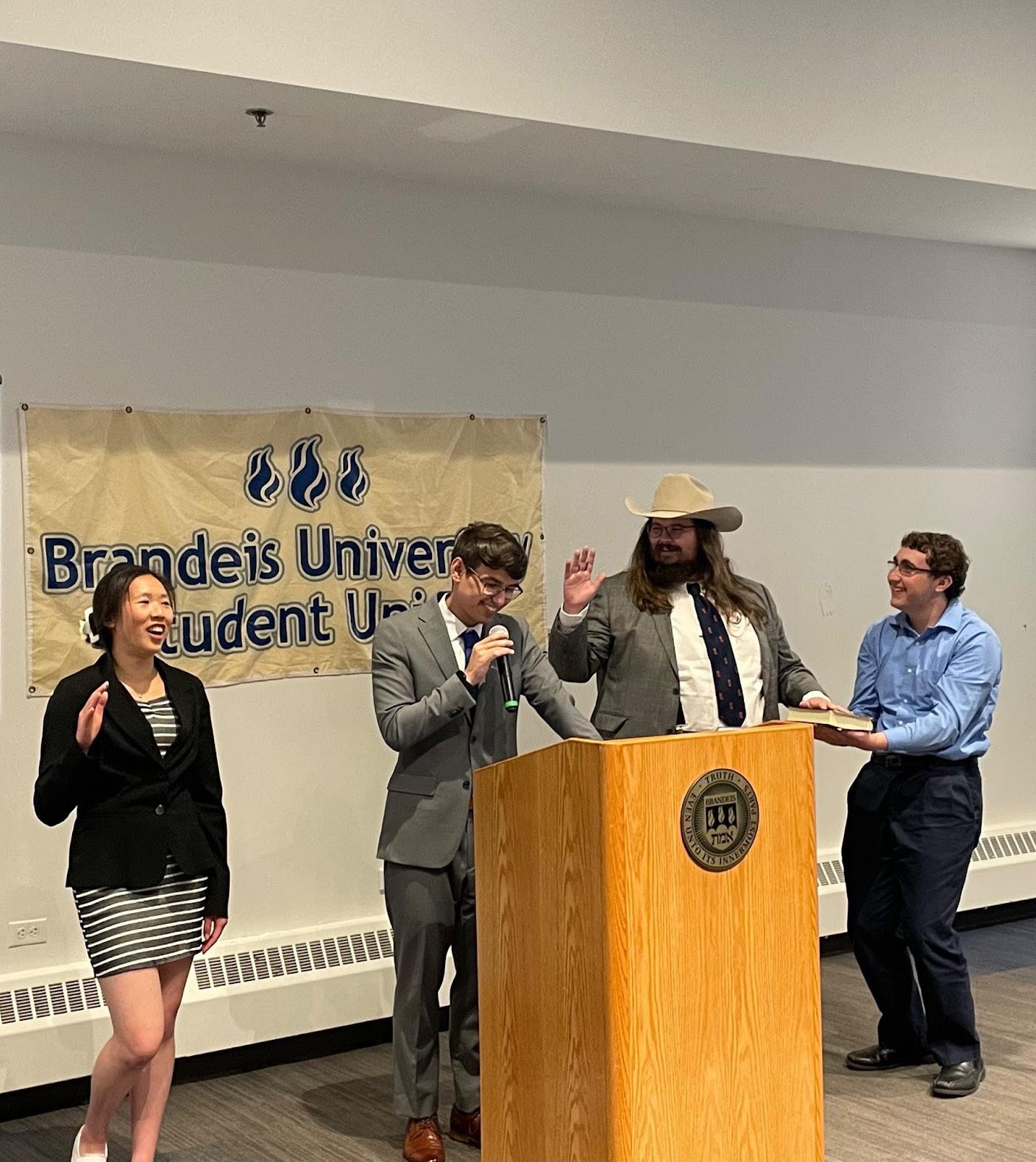
THE JUSTICE ● NEWS ● MONDAY, MAY 22, 2023 5
CONTINUED FROM 1 FOOD INSECURITY:
■ Former Union President Peyton Gillespie ’25 welcomed the new administration and recapped the semester’s activities in the State of the Union.
STATE OF THE UNION : Outgoing President Peyton Gillespie ’25 swears in new President Noah Risley ’24 and new Vice President Erica Hwang ’25 at the State of the Union.
MAX FEIGELSON/the Justice
Facts are facts, America.
ON THIS DAY…
In 1972, Richard Nixon arrived in Moscow. His visit was the first by a U.S. president to the Soviet Union.
New England has a Nazi problem
Sugar delays the setting time of concrete.
it
Content warning: this article discusses and contains images of and pertaining to instances of white supremacy, Nazism, and related violence.
On a rainy Saturday in January, dozens of families gathered at the public library in Taunton, Massachusetts for a drag queen story hour hosted by local queen Monica Moore. In a flowy purple gown and long blonde tresses, Moore began reading a picture book as the young children sitting on the colorful rug listened intently.
Within minutes, a small group of men in black jackets, khaki pants, and ski masks — the de facto uniform of New England’s very own Nazi group, NSC-131 — entered the room and began calling Moore names, including “groomer,” “pedophile,” and “street whore.” Parents offered Moore encouragement as she continued reading, but when one of the masked men sat in the reading circle next to children and parents, some families quickly left. Outside the library, they were met with over a dozen more masked men who held a banner that read “Drag Queens Are Pedophiles!” and shouted at parents, calling them abusers as they walked past with their children.
This wasn’t the group’s first time protesting a children’s story time event. In July, three people were arrested and a civil rights investigation was launched when NSC-131 members protested a book reading featuring drag queens in Boston’s Jamaica Plain neighborhood. Two of those arrested were counterprotestors trying to prevent the story time event from being disrupted. Christopher R. Hood Jr., the leader of NSC-131, was the only Nazi arrested that day.
Hood is a 24-year-old white supremacist from Malden who has been involved in far-right extremist organizing since he was 16. He was allegedly kicked out of the neoNazi group Patriot Front in 2019 for stealing funds to buy marijuana. In late 2019, Hood began posting on Facebook about a new group he was starting, which eventually became the Nationalist Social Club-131. The numbers 131
By CAYENN LANDAU AND NATALIE KAHN JUSTICE EDITORS
are alphanumeric code for “ACA,” which stands for “anticommunist action.”
Based in Massachusetts, NSC-131 is a relatively small group with regional chapters throughout New England. Its goals are ambitious: to transform New England into a white ethnostate.
They distribute propaganda and threats in neighborhoods and hang racist banners on highway overpasses across New England. Hood and fellow NSC-131 member, Leo Cullinan, are currently charged with violating New Hampshire’s civil rights laws after hanging a banner that read “Keep New England White” on a Portsmouth overpass. The men are struggling to find a New Hampshire lawyer willing to represent them, but have raised over $13,000 dollars in their online fundraising campaign for legal fees.
NSC-131 eschews the pro-America rhetoric and imagery employed by other white supremacist groups such as Patriot Front. The group uses well-known symbols of Germany’s Nazi Party in their logo and flags and members proudly refer to themselves as Nazis. The NSC manifesto explains that they use Nazi imagery to “attract more attention,” to be “taken more seriously,” and to prevent their message of white supremacy from being diluted.
NSC-131 desires a total governmental overhaul; their manifesto calls for radical action to completely reconstruct the current political system.
“We become less fringe with every successful action,” the manifesto states, also claiming that the popular rightwing causes of the day align with Nazism. “We remind [white] people that it is Nazism to oppose White demographic replacement. It is Nazism to oppose Drag Queen Story Hour and Critical Race Theory.”
At last year’s St. Patrick’s day parade in Boston, NSC131 garnered international attention when around a dozen members displayed a banner that read “KEEP BOSTON IRISH.”
But NSC-131 isn’t just a threat to Boston. The group’s regional leader for Massachusetts, Liam MacNeil, was born and raised in Waltham, and remains active locally. An anonymous local activist sent the Justice a 2022 NSC propaganda video showing the group marching, putting up stickers, and posing with a banner in the Moody Street area. The video also appears to show a police officer speaking with the group before walking away.
Tracking an increase in violence
On July 25, 2022, Hood arrived for his hearing at a Boston courthouse. He’d been charged with fighting in a public place after his arrest a few days prior at the drag story event in Jamaica Plain. This was Hood’s third arrest in Boston; the first two were dismissed.
Dressed in black and flanked by four other members of NSC-131, Hood found himself face-to-face with Rod Webber, a local filmmaker, performance artist, and activist. Webber was filming the group as they walked toward the door, when one of the NSC members shoved him and he fell to the ground.
Webber emerged mostly unscathed. He followed the group up to the courthouse door, but was stopped by Boston police. During his interaction with an officer, Webber fell down the courthouse stairs; he said the police pushed him down and he was taken into custody. Online, NSC began to celebrate the attack, using the video as a demonstration of violence and power for online recruitment tactics.
This wasn’t Webber’s first time interacting with NSC members. Webber and his wife, Lauren Pespisa, have been filming NSC’s public activities since 2020. They first encountered the group while collecting footage for Webber’s documentary, “2020: The Dumpster Fire,” about that year’s protests and presidential campaigns.
Webber and Pespisa have interacted with NSC-131 close

VERBATIM | MONIQUE HEART
FUN FACT
just
6 MONDAY, MAY 22, 2023 ● FEATURES ● THE JUSTICE
features
— here’s how activists around the Boston area are fighting
Design: Hedy Yang/the Justice
Citizen activists are stepping up their offensive strategies toward the insidious New England Nazi group NSC-131 as law enforcement fails to pin down the white supremacists in their communities.
FACE OFF: Antuan Castro del Rio (right), a local activist, confronts members of NSC-131.
Photo courtesy of ROD WEBBER
to a dozen times since then: “But they’ve really stepped up their efforts in the past two years,” he said during a May 13 interview with the Justice.
NSC was even present during the Jan. 6 insurrection in 2021; Liam MacNeil posted a photo on Telegram holding a Capitol police officer’s helmet that appeared to have been seized. According to messages on the group’s Telegram channel, members chose to show up in small numbers at the insurrection to “ensure white safety.” To this day, no one in NSC-131 has been taken into custody or faced legal consequences for their role in the insurrection.

Webber said NSC’s demonstrations are “more akin to flash mobs” than rallies because they keep their plans secret and show up unannounced. These mobs have grown in size over the years. “The more recent ones [had] 20, sometimes close to 30 guys running around with a mask on their face doing Sieg Heil [Nazi] salutes,” said Webber. The group has also gotten more violent over the years, according to Pespisa.
On May 10, 2023 an NSC member from Salem, New Hampshire was sentenced to 18 months in prison for illegal possession of machine guns. Authorities said Kyle Morris, 23, kept the two guns in a room with over 20 other
firearms and an array of Nazi paraphernalia, including a Nazi uniform and a framed photo of Hitler. Authorities said Morris advocated for a race war and the bombing of mosques and synagogues. They found evidence of Morris’s desire to participate in “lone wolf” terrorist attacks in Massachusetts, “culminating in a plan to drive a truck bomb into the Massachusetts State House.”
Pespisa and Webber said that in light of the Morris case, it is apparent that the threat posed by NSC goes beyond harassment and assaults on the street. With NSC doing everything they can to make minority groups feel unwelcome in New England and the threat of terrorism looming, the couple said the government’s response has been woefully inadequate.
But Webber and Pespisa aren’t the only activists disappointed with the government’s response to NSC’s activities — and they aren’t the only ones willing to do something about it. At the time of Webber’s courthouse confrontation with NSC members, a team of veterans at the national nonprofit Task Force Butler were compiling a damning, over 300-page report on the Nazi group’s illegal activities. As NSC bragged about the violence outside the courthouse, Task Force Butler analyzed the footage frame-by-frame. They identified the individuals involved and added it to the long list of NSC’s violence, intimidation, and threats in a report on the Nazi group.
Task Force Butler hopes law enforcement will use the report to hold NSC legally accountable for racketeering, among other crimes. “These trolls thrive in darkness,” Kris Goldsmith, the CEO of Task Force Butler, said in a May 3 interview with the Justice. “When you shine a spotlight on them, they shrink like violets.”
Community organizations fight back
Ernst Jean-Jacques, known as Shimmy, is a Boston civil rights activist. He created the Freedom Fighters Coalition to bring together social justice organizers for marches and community events. What he didn’t expect was that the organization’s Instagram page would become a hub for sharing videos and information about white nationalist groups’ activity in the Boston area, mainly NSC-131 and Patriot Front.
Not long after the Coalition’s inception, folks who came across white supremacist banners, flyers, and groups began sending Jean-Jacques picture and video proof. He would share them to the Freedom Fighter account’s growing follower base. He wanted people to see what was happening in their own city, and make even a small dent in the widespread lack of awareness among the general public about fascist groups in Massachusetts. “Not posting about them and pretending like they don’t exist, that’s not gonna help. … These people are here in
this state, whether people want to accept it or agree with it or not, they’re here,” he told the Justice during a May 11 interview.
“Garfield,” or @antifagarfield on Twitter, is an anonymous New England researcher tracking and publicizing NSC-131’s activities with a similar mindset to JeanJacques’s. Garfield identified Liam MacNeil in 2021, alongside other members of NSC-131. “A significant body of my work has been tracking and identifying NSC since their early days, and while they of course are still a huge threat to communities across New England, antifascists, researchers, and everyday community members have been a constant barrier … against the violence NSC hopes to inflict,” they told the Justice in a May 21 correspondence. “It’s been demonstrated time and time again that police are not willing to take action … so it often falls on communities to defend themselves.”
To their point, it’s not just individual activists and intelligence groups fighting back against Nazis in New England. Leftist, on-the-ground activism groups have organized counter protests that far outnumber, and often drown out, NSC’s hateful demonstrations and chants.

On Dec. 10, 2022, members of NSC-131 showed up outside the Fall River Public Library during a monthly drag storytime event. They shouted slurs and performed Nazi salutes as families entered and left the library. A video montage posted by NSC days later includes blurred footage that appears to show members rushing toward the library entrance and physically attacking a small group of people standing in front of the doors in support of the event happening inside. The masked men injured and threatened several people involved with the story time event. Two of the people assaulted said the police present did little to stop the Nazi’s violent behavior. The Fall River police department denied witnessing any violent incidents.
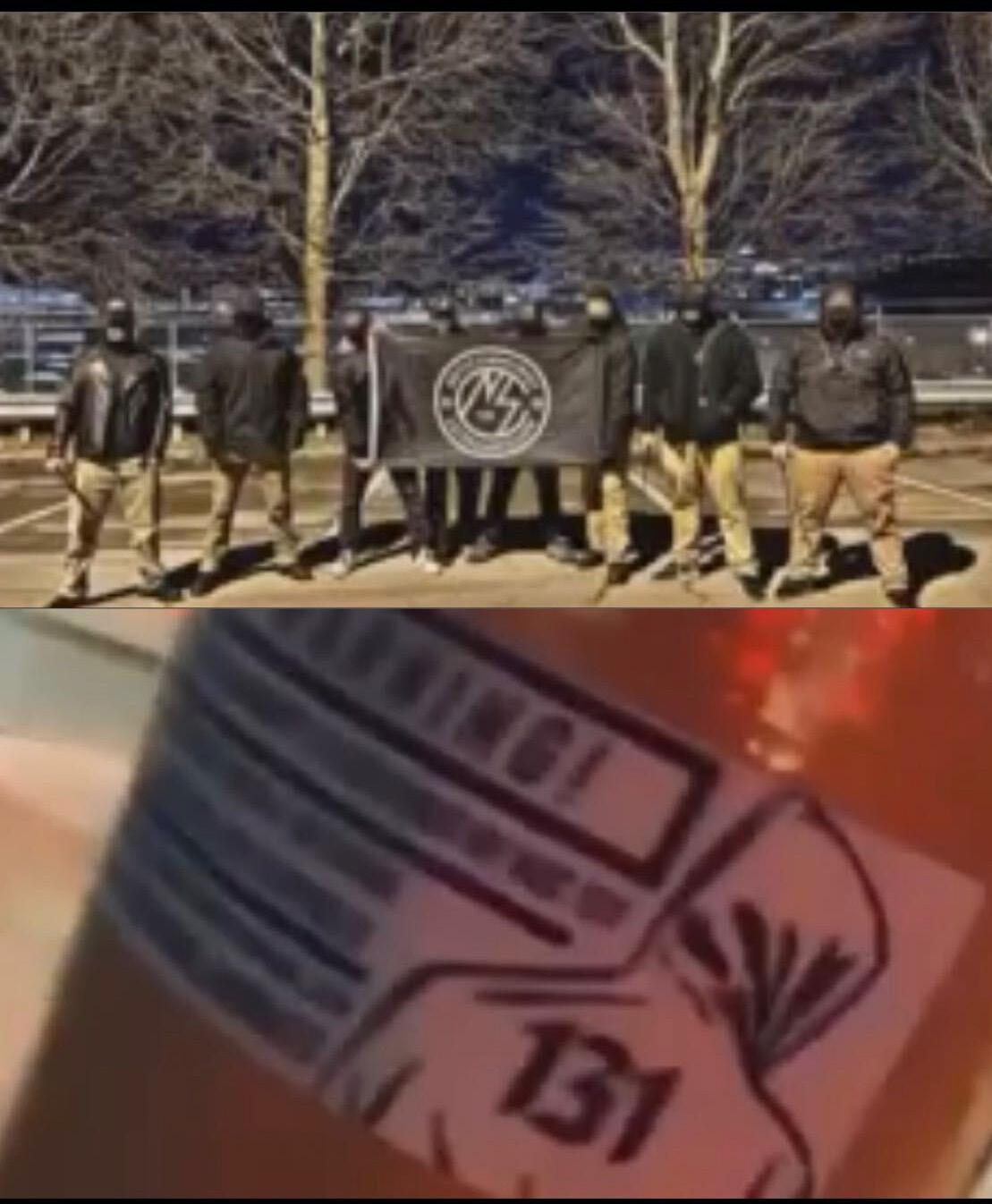
The following month, the Fall River library held another drag storytime. This time, however, a crowd of more than 100 people gathered outside the library to show support and protect the event from Nazis and right-wing extremists. Options Magazine reported that the Boston Democratic Socialist Association organized the demonstration. Members of groups including the South Coast LGBTQ+ Network and the leftist “community defense” organization, John Brown Gun Club, were present as well.
Sean Connell, who performs in drag as Miss Gloria and leads the Fall River storytimes, told Options she was “blown away” by all of the support: “We’re really trying to show the community here how much love and support we have and how much stronger love is than hate.”

Design: Hedy Yang/the Justice THE JUSTICE ● FEATURES ● MONDAY, MAY 22, 2023 7
INSURRECTION: Members of NSC-131 boasted on Telegram about being present at the Jan 6 Capital insurrection.
Photos courtesy of TASK FORCE BUTLER WALTHAM: Stills from an NSC-131 propaganda video, provided by a local anonymous activist, show the group in Waltham.
Photo courtesy of ANONYMOUS
“NAZI HUNTER”: Kris Goldsmith is the CEO of Task Force Butler.
Photo courtesy of KRIS GOLDSMITH
Isabel Roseth, Editor in Chief
Smiley Huynh, Managing Editor
Jen Crystal, Cameron Cushing, Jane Flautt, Sofia Gonzalez , Senior Editors
Leah Breakstone, Dalya Koller, Lauryn Williams, Deputy Editors
Juliana Giacone, Samantha Goldman, Megan
Liao, Natalie Kahn, Jack Yuanwei Cheng, Ariella Weiss, Associate Editors
Sophia De Lisi, Anika Jain, News Editors
Cayenn Landau, Features Editor
Tibria Brown, Forum Editor
Aiden Guthro, Sports Editor
Mina Rowland, Arts Editor
Owen Chan, Ceci Xilei Chen, Photography Editors
Julia Hardy, Jenna Lewis, Madison Sirois, Copy Editors Anna Martin, Layout Editor
Maddy Dulong, Elizabeth Liu, Ads Editor
Zachary Goldstein, Eden Osiason, Online Editors
Asking for a friend
If you are interested in submitting advice for the upcoming column, follow our Instagram: @thejusticenewspaper.
This week we asked for their sage advce and wisdom from graduating students of the class of 2023.
“College changed my life forever. I feel like I came to Brandeis and I’m leaving with what I needed. I’ve grown emotionally, spiritually, and professionally. As someone who doesn’t have a huge support system and is a first gen college student, it’s important to remember to take advantage of what this university has to offer Don’t be afraid to ask and challenge the University. Your experience is what you make it. It’s all about your mindset.”
— Ilana Rodriguez ’23
“Please be forgiving of yourself — senior year can be a really fun but sometimes intense time of transitions, accomplishments, and self-reflection, and it’s important to tell yourself to take a breath and immerse yourself in the final few moments of college. It’s easy to get stressed out about the future, especially when everyone you know is asking you, ‘So what are you doing after college?’ One, it’s okay if you didn’t accomplish all the things you expected when you started college, and two, it’s okay if your life post-graduation looks a little different from what you imagined.”
— Jane Flautt ’23
EDITORIAL
Good luck, guys! Sending off 2023 graduating Justice editors
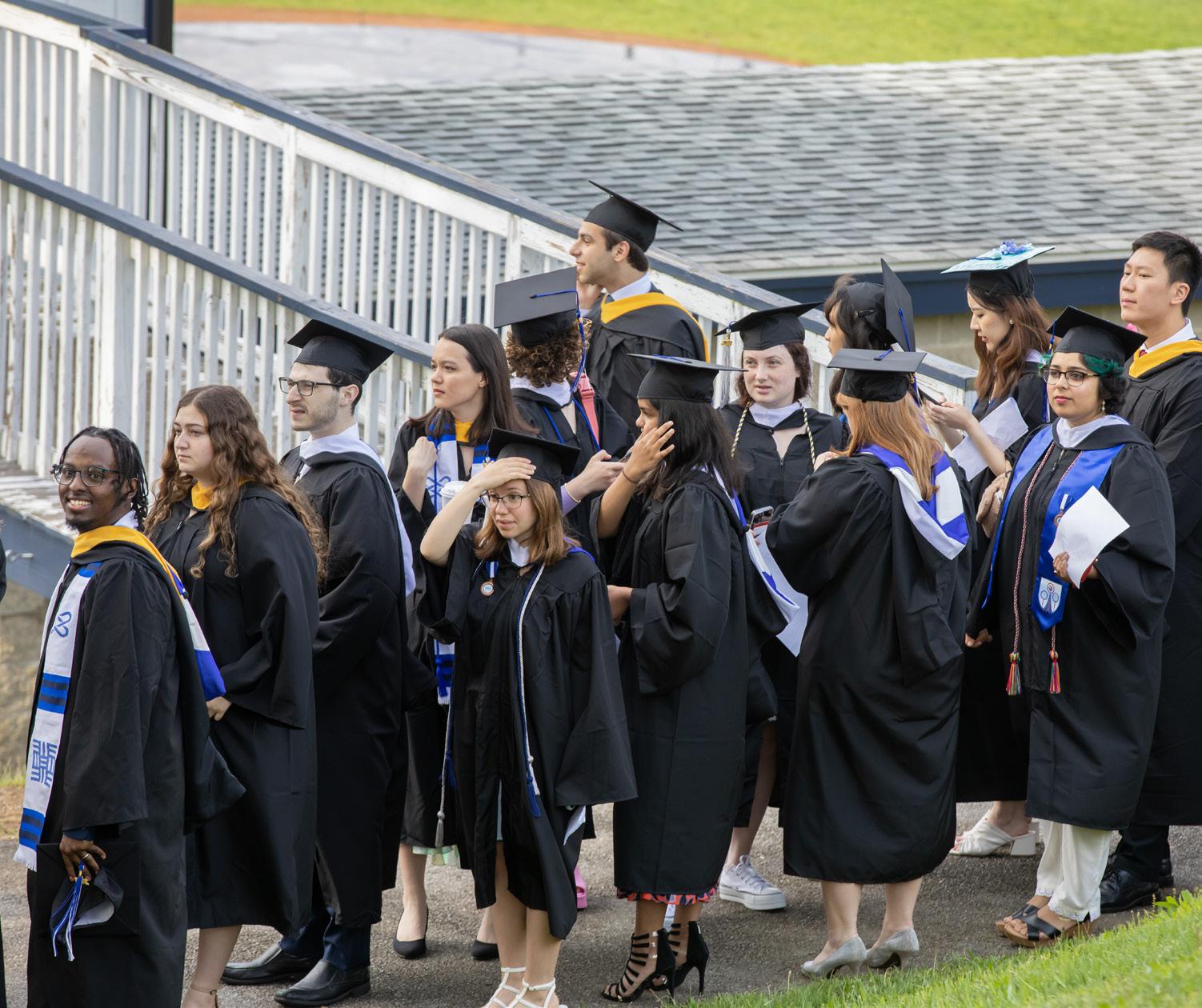
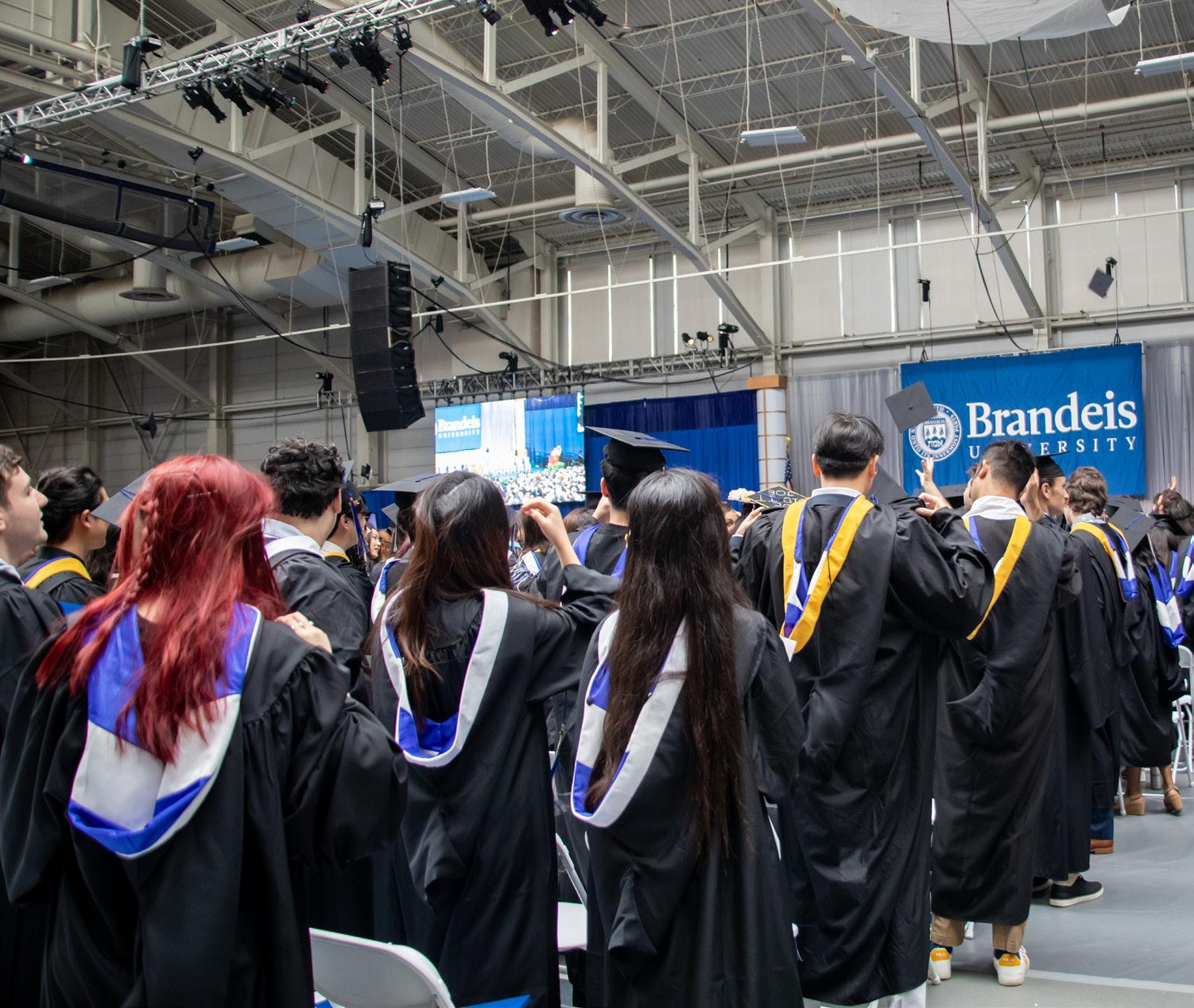
Saying goodbye to our graduating editors is always a bittersweet moment: after countless late nights spent together, our hearts are filled with pride and hope for all that they will accomplish next. Our soon-to-be graduates remain steadfastly dedicated to the Justice, and Brandeis is all the better for their contributions to journalism. Please join us in recognizing the Justice editors graduating this spring in the Class of 2023.
Jen Crystal has served the office with great care and dedication for the past academic year as the editor in chief. She first joined the spring semester of her first year at Brandeis and quickly became editorial assistant for the News section before becoming the section’s editor during the COVID-19 shutdown. Being the editor of a campus publication is not easy, but Jen’s commitment to the Justice never wavered. She is beyond professional, leading with compassion and empathy and always has the best interest of the Justice staff and the entire Brandeis community in mind. She humanizes journalism, approaching subjects sensitively and thoughtfully in her coverage of a variety of topics, whether that be the war in Ukraine, accessibility on campus, sexual violence, or the 2020 election.
The lifeblood of the Justice, Jen’s dedication to journalistic integrity will not soon be forgotten. It’ll be strange to start next year without her here, but we wish her all the luck as her Brandeis career comes to a close.
Jane Flautt has kept the Justice running smoothly and has been an integral part of the paper ever since she started. She started as a Copy staffer in her first year before taking over as Copy editor. From there, she was appointed as managing editor, where she’s gone above and beyond. Her otherworldly patience and kindness have allowed her to flourish and make the Justice community that much better a place to be. Jane has left her mark on all of us. Ever organized and put together, she’s kept the Justice on course no matter what. She will be missed.
Cameron Cushing has been the backbone of the


Justice during his time at the paper. His wit, sophistication, and hard work have led him to serve as a role model for all of us. Cam served as Copy editor in 2020, became managing editor in 2021, and became a senior editor in 2022. He has meticulously worked behind the scenes at the Justice, ensuring that everything runs smoothly. His most recent project was building the staff page on the Justice website.
Cam will do great things, but we hope he knows he always has a home here at the Justice.
Sofia Gonzalez has served as an example of quiet grace and fierce dedication for the entire Justice staff during her time at the Justice. A rare STEM major dabbling in the world of journalism, Sofia became Features editor in 2020.
Due to her talent, hard work, and dedication, she was eventually elected editor-in-chief in 2021. Sofia led the paper elegantly and efficiently — her diligence and kindness made her an excellent leader before she was eventually voted up to senior editor in 2022. Her work at the Justice has often covered serious topics, such as COVID-19, the 2020 presidential election, and fighting systemic racism on Brandeis’ campus. Sofia left a large legacy at the Justice, and though we know she is off to do great things in the world, her Justice family will miss her dearly.
Juliana Giacone has exhibited dedication and fervor during her tenure at the Justice. In September of 2020, Juliana began writing for the Features section, where she covered a myriad of topics such as the impact of COVID-19 on international students’ access to higher education, an insider perspective of Brandeis mail service employees, or the surge of anti-Asian racism during the pandemic. As a Features and associate editor, she continuously advocated for staff writers to conduct ethical and honest reporting.
Juliana explored her passion for journalism beyond the Justice, serving as a university department representative for the Journalism department from 2022-2023. In the fall of 2023, she will be pursuing a graduate degree at the Columbia University Graduate School of Journalism. It has been an honor to work alongside Juliana, and we know that she will
accomplish amazing things.
Natalie Kahn has made a name for herself as a brilliant and glittery powerhouse on campus — and an equally brilliant and glittery associate editor at the Justice. Natalie became the Features editor in 2022, and with incredible care, pushed the section to expand coverage toward a variety of issues affecting student and faculty life on campus.
Natalie also promoted accessibility to Boston’s queer nightlife through the creation of @queerboston on Instagram. Weekly, Natalie pushed writers to dig deeper into every story while simultaneously pushing herself to explore the tiny bright pockets in different corners of Boston. Natalie is an incredible writer and leader. We cannot wait to see all she does. Wherever she goes, we know she’ll make it brighter.
Megan Liao, the ray of sunshine, will be sorely missed at the Justice. It is painful to think of a paper that doesn’t include her wonderful illustrations or insightful articles. Starting in 2020 by submitting gorgeous sketches, her breathtaking artwork was a highlight feature of the arts section.
Megan’s leadership and strong organizational skills made her an obvious selection for the Arts editor position. She’s embedded her bright shining personality into every edition of the Justice, creating a unique aesthetic for her section. Promoted to associate editor in 2023, Megan remained a strong senior presence in the Justice office. Whether it was photos, sports, or arts, Megan’s influence and unmatched passion could be seen on every page. Megan is a beautiful soul whose kindness will always be remembered by those who had the privilege to work with her.
Jack Yuanwei Cheng’s passion and dedication to photography and journalism have been a gift to the Justice throughout his tenure. Having joined in 2021 as an editorial assistant and quickly rising to the role of Photography editor, Jack established himself as an integral part of the publication’s operations. In addition to fulfilling his regular duties, he took countless photos and led his team of photographers. Jack came into the office every day with
enthusiasm that could not be matched, leaving everyone smiling.
We know Jack will go off and do amazing things, but his presence at the Justice is going to be missed dearly. His legacy will live on as his Brandeis ID sits pinned above the Photos section desk, always watching over us.
Samantha Goldman has been a vital part of the Justice since her arrival at Brandeis. Starting out in the News section as a staff writer, Samantha’s creativity and passion for reporting were spotlighted. She quickly transitioned into becoming the Online editor at the Justice — a position that would define her career here.
In this role, Samantha developed the Justice’s social media presence and led us into the digital media era. After nearly three years of building up social media, she was promoted as an associate editor. Within this role, she still regularly contributed to the creation of content for social media to ensure the section’s sustainability long-term.Samantha’s calming presence and laid-back attitude will be missed by all members of the Justice.
Maddy Dulong has made a lasting impact on the Justice, and has totally revamped the Ads section in the process. Although she’s only worked at the Justice for a short while, beginning this past semester, Maddy became the new Ads editor and quickly got the section up and running again. Her ideas and plans for the future of the section have also helped with its growth and expansion. Maddy also pleasantly surprised everyone with her extensive horoscope knowledge, which the Arts section highlighted multiple times. Her kindness, patience, and humor will be missed.
Established 1949 10 TUESDAY, MAY 22, 2023 ● FORUM ● THE JUSTICE Justicethe
Brandeis University
ANNA MARTIN/the Justice
Q:
SMILEY HUYNH/the Justice LINE UP: Seniors wait to walk into Gosman at commencement. CONGRATULATIONS/REJOYCE: Graduates cheer at the recessional of commencement SMILEY HUYNH/the Justice
A:
One more to go: Anticipating my senior year
By MARK RAMIREZ PEREZ
CONTRIBUTING
I decided to start my college career because all my friends were doing it and my family expected it from me. All of my friends in high school wanted to go to college, which inspired me to pursue it as well. Being surrounded by that all the time, it felt like the only option after high school. So, I spent years working toward college, getting good grades and leading organizations to make my parents proud.
My parents committed years of their time and energy into emigrating from Mexico to the United States with aspirations for me to succeed. They traveled from the southernmost state of Mexico all the way to the Texas border. Then they traveled throughout the southern American states and settled in Atlanta to meet with others in our family.
The entire journey was scary for them, because they had to trust a stranger to give them safe passage to the U.S. over the course of a week. When they eventually settled in Georgia, my dad had to find a job in Atlanta to support himself and my mom. They planned to start a family soon after they got their footing in order to provide my younger sister and me with a life of
modern amenities such as the internet, so we could thrive in the increasingly technological globalized world. Though they didn’t force me to take on their plans for me, their journey pushed me: They had done all the work of ensuring I had a bright future in the U.S., and I didn’t want to disappoint them.
Even though I spent high school working hard to do the best I could and ensure I went to a good college, I didn’t have a concrete plan of what to do when I finally got here. Initially, I just knew I wanted to go to a school out of state to push myself out of my comfort zone and experience new things.
I decided to move to Massachusetts and attend Brandeis because it seemed like a small, supportive school where I could learn more about the world in a safe environment. I liked that competitiveness wasn’t a big thing here and that everyone seemed to be trying to help each other do their best.
Now that I’m ending my junior year and getting ready to transition to the last year of my academic career, the reality of everything is catching up to me.
The past semester has felt like a blur: Everything’s moving slowly now as I finish finals and pack my boxes for the last summer of my
college career. When interacting with other people from the class of 2024, I realize that they seem more excited about their final year than I am. They’re starting to plan for jobs after college, working on their senior thesis, and chatting about their plans for the future.
But I’m just tired — tired of the stress of school. Especially after this spring’s events and being unable to live on campus in the fall, I’ve become so disappointed with Brandeis that spending another year here sounds exhausting.
The exhaustion of this past semester, in combination with my first year being the “COVID year,” made me ambivalent about my college journey. During my first year of college and senior year of high school, I didn’t experience the fruits of my labor.
The four years of high school where I worked hard to achieve the most I could ended with stacks of assignments and Zoom calls — no prom, no graduation, and no catharsis for all the stress I accumulated over the years. When I got to Brandeis, almost every student on campus was utterly isolated from each other and the world. I never got the chance to establish footing for myself here, so everything feels so far away.
However, as I transition into my final year of school, I’m hopeful. During my first and second
years, I didn’t have the opportunity to engage with the community on campus, so I stayed almost completely isolated.
However, during my junior year, I got involved in clubs like the Campus Activities Board and Gen 1 to be around other people like me. I’ve been able to carve out a place for myself and feel more fulfilled. Though I’m partially dreading another year of school, I’m excited to see what else is coming.
As I see some of my friends in the class of 2023 graduate and move on to the subsequent phases of their lives, I’m becoming inspired to start thinking the same. Though some of them are worked up about getting all their arrangements together for commencement and finalizing their courses, overall, they seem relieved. I can’t wait to be the same in a year.
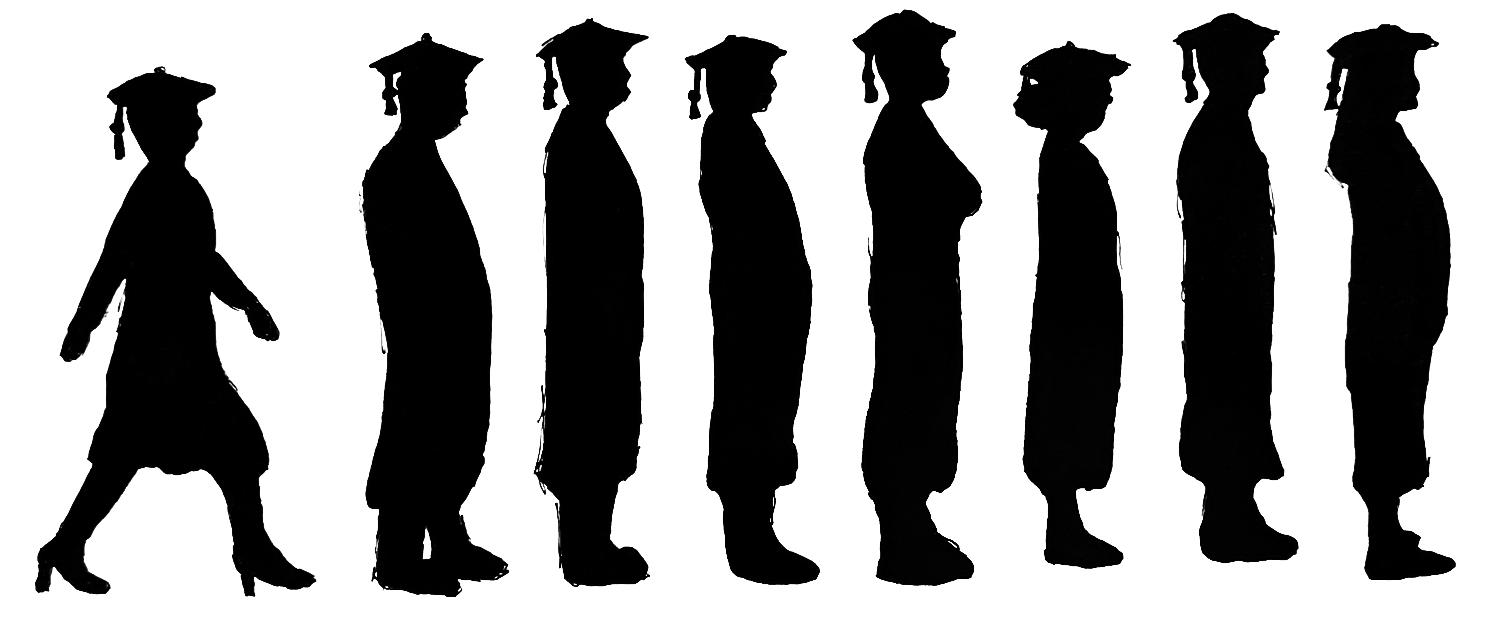
Though I’ve had a turbulent time at Brandeis, I’m happy I’ve been able to experience it. I’m proud of my accomplishments academically and within the campus community. It’s allowed me to make my family proud because, in 2024, I will be the first in my family to achieve a college degree. I can’t wait for the looks on their faces and the relief I’ll feel when everything’s over.
Goodbye Brandeis: I’m ready to move on
By MADDY DULONG JUSTICE EDITOR
As a graduating senior, I’m sure many of my peers can relate because I can’t wait to get off this campus. I have wanted to leave since I first arrived as a mid-year student in January 2020, so this has been a long time coming. Was it worth it to stick it out and finish my degree?
I’m not sure.
I was accepted to Brandeis as a mid year student in the spring of 2019. At first, I just saw the confetti on the webpage and didn’t look further at what the actual letter said; it wasn’t until a few weeks later that I saw that I wouldn’t be attending in the fall like all the other students, but rather, I was chosen as a “special” group to enter in the spring 2020 semester instead.
I didn’t have a choice in the matter; if I was going to attend Brandeis, it was either as a midyear or not at all. I ultimately chose Brandeis because the financial aid package they offered me was too good to turn down. The deal still upset me because I had to wait longer to matriculate into college and I had no say.
I am thankful for the opportunity to gain work experience during my midyear semester. However, that experience was the first of many times I encountered inaccessibility here. I got to study abroad through Brandeis during my gap semester in the fall of 2019, but they
neglected to mention that I wouldn’t be fully enrolled as a Brandeis student until Jan. 1 and would not have access to my financial aid package. This lack of communication put my family in a situation to pay upwards of $10,000 in study abroad bills out of pocket.
After trying out all my options — crying and begging my family to somehow come up with that money out of thin air — I did not study abroad that semester.
Instead, I worked three different retail jobs to save extra spending money at school.With the administration issues, COVID-19, the parking tickets, and the overwhelming sense of melancholy flooding this campus at all times, the vibes here were almost always miserable.
I have had nearly no “college experience.” My experience over the past 3-ish years has been full of parking tickets — I finished my degree with 105 parking tickets total — endless assignments, a small handful of friends, a changed personality, and no free time.
Overall, the primary reason I stayed here was my outstanding education over the past three years, which was worth it. Every professor I had has been incredible, and I have learned so much from them. For that reason alone, I wouldn’t have traded this experience for another.
However, I also shouldn’t have had to conform to a specific standard of speaking and
acting to be taken seriously in my courses. I go home now and find that I have been forcing myself to assimilate to this school’s community for so long that it’s becoming increasingly difficult for me to fit in with my community — the one I fought so hard to represent here at Brandeis.
I shouldn’t have to see current students from my high school touring the campus and warn them not to come here because they wouldn’t fit in. Shockingly, my biggest issue at Brandeis does not lie within the administrative issues, but with the inaccessible culture the students and faculty have created and upheld here. People cannot change where they come from, but I wish the people I’ve interacted with could acknowledge their privilege. A privileged perspective shouldn’t be the only proper perspective to succeed at Brandeis. Those who don’t conform shouldn’t be pressured into changing or be silenced because they don’t “fit in.”
I have even been pretty successful as far as extracurriculars and jobs here; I have held a position in the archives of the library for the past two years, I’ve become the undergraduate departmental representative of the Independent Interdisciplinary Major program, I ran the social media for the Journalism department, and I became Advertising editor at the Justice this spring.
Although I’m proud of my achievements at this University, they don’t make up for the
overwhelming sense that I haven’t belonged here. That sense may be proper. It’s well known that higher education is intended for those who can afford it and inaccessible to anyone else.
Fortunately, my experiences at Brandeis have accurately prepared me for the professional working world after graduation. I think it’s hypocritical of Brandeis to favor an elite, white perspective given its founder Louis Brandeis’ “commitment to helping the common man” in pursuing an education, being the first university of its kind to “bridge the gap between social welfare and social policy.”
It’s common knowledge that the rest of the world favors the elite. If nothing else, I’m thankful I learned how to fit in before being sent off into the professional world. Unfortunately, Brandeis didn’t serve as the best buffer for me before I was sent off into the corporate world to interact with rich, white men who would talk over me for the rest of my life as I entered the job market.
Overall, my time here was tumultuous because I never felt like I was fully embedded in the campus community. However, the relationships I’ve made with my professors and the education I achieved made spending my time here worth it.
THE JUSTICE ● FORUM ● TUESDAY, MAY 22, 2023 11
JUSTICE
WRITER The Justice welcomes letters to the editor responding to published material. Please submit letters through our Web site at www. thejustice.org. Anonymous submissions cannot be accepted. Letters should not exceed 300 words, and may be edited for space, style, grammar, spelling, libel and clarity, and must relate to material published in the Justice. Letters from off-campus sources should include location. The Justice does not print letters to the editor and op-ed submissions that have been submitted to other publications. Op-ed submissions of general interest to the University community — that do not respond explicitly to articles printed in the Justice — are also welcome and should be limited to 800 words. All submissions are due Friday at noon. Write to us The opinions stated in the editorial(s) under the masthead on the opposing page represent the opinion of a majority of the voting members of the editorial board; all other articles, columns, comics and advertisements do not necessarily. The Justice is the independent student newspaper of Brandeis University. Operated, written, produced and published entirely by students, the Justice includes news, features, arts, opinion and sports articles of interest to approximately 3,600 undergraduates, 2,000 graduate students, 565 faculty and 1,300 administrative staff. The Justice is published every Tuesday of the academic year with the exception of examination and vacation periods. Advertising deadlines: All insertion orders and advertising copy must be received by the Justice no later than 5 p.m. on the Thursday preceding the date of publication. All advertising copy is subject to approval of the editor in chief and the managing and advertising editors. Fine Print The Staff For information on joining the Justice, write to editor@ thejustice.org. The opinions expressed on this page are those of each article’s respective author and do not reflect the viewpoint of the Justice. E a Forum: Xavier Wilson P a Photography: Eliza Bier s News: Maria Antonio, Amanda Chen*, Grace Doh, Sydney Duncan, Max Feigelson*, Anna Martin, River Simard, Sophia Stewart, Ariella Weiss, Hedy Yang, Lea Zaharoni Features: Zev Carlyle, Maddy Dulong, Jessie Gabel, Natalie Kahn, Meshulam Ungar, Ariella Weiss, Lea Zaharoni Forum: Tasha Epstein, Mirabell Rowland, Lauryn Williams Sports: Josh Gans, Zachary Goldstein, Megan Liao, Prateek Kanmadikar, Jackson Wu*, Aki Yamaguchi Arts and Culture: Elijah Chen, Craig Disken, Ethan Gerstman, Megan Liao Photography: Natalie Bracken, Jack Yuanwei Cheng, Tiancheng Zheng* Copy: Wenli Cai, Solana Jolly, Elizabeth Liu, Ava Privratsky, Sara Samuel, Daniela Zavlun, Nataniela Zavlun Layout: Emily Hou, Hedy Yang Ads: Sophia Stewart Online: Amanda Chen, Sabrina Waddell * denotes a senior staff member. ANNA MARTIN /the Justice


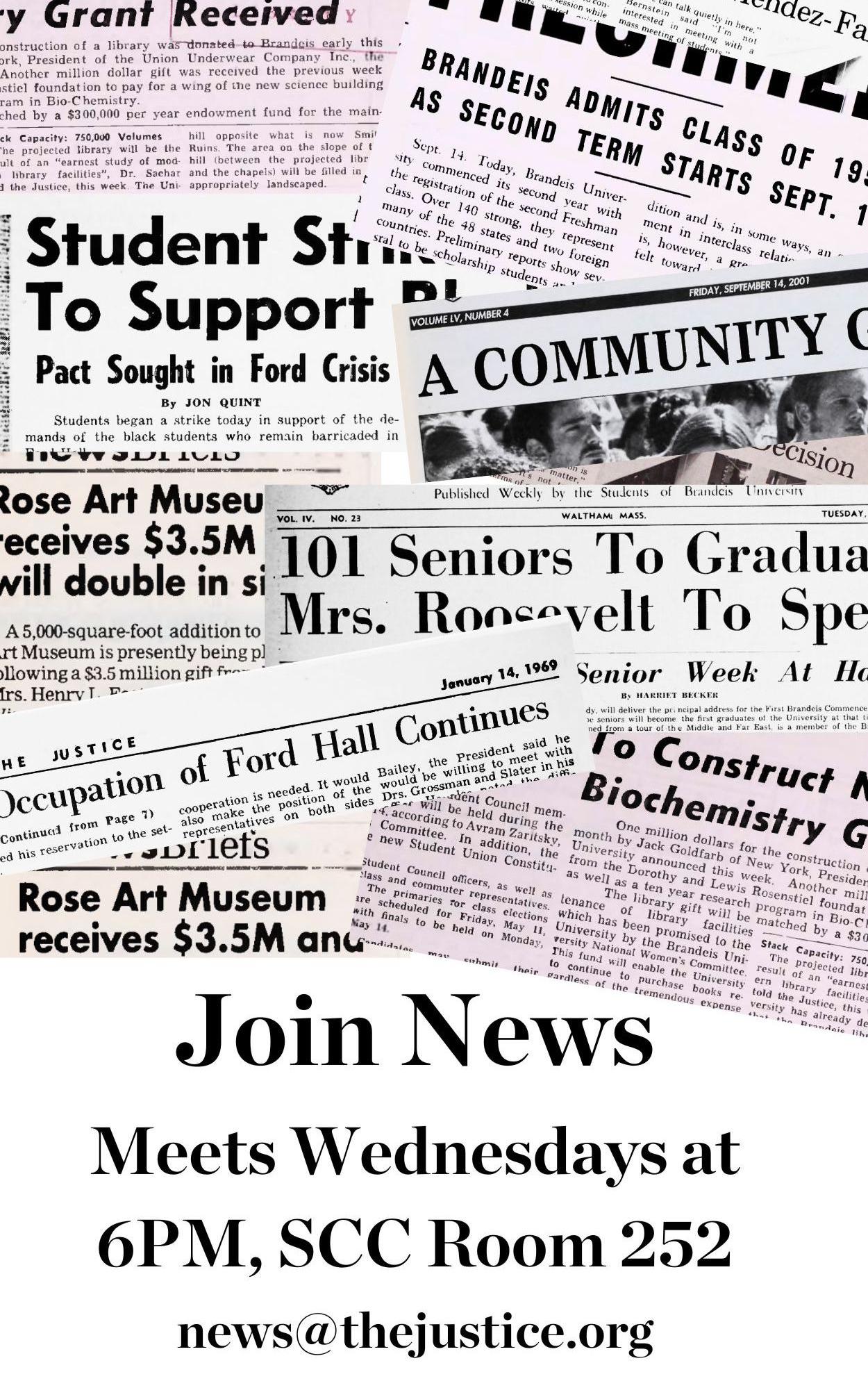
SOFTBALL: Seniors bid farewell to Brandeis
CONTINUED FROM 14
time at Brandeis.
Penton was an absolute firecracker on the mound. The yin to Medici’s yang, Penton was the vocalist for the team — often spearheading the chants. On the pitching rubber, she was a reliable option, playing in nine games this season and starting three. Penton is applying to medical school next year while also working for Boston Children’s Hospital.
Micale can always be seen wearing a smile on the field. Coming in as a pinch hitter for a majority of the 2023 season, Micale recorded a respectable .235 batting average with 2 RBIs. As a catcher, her

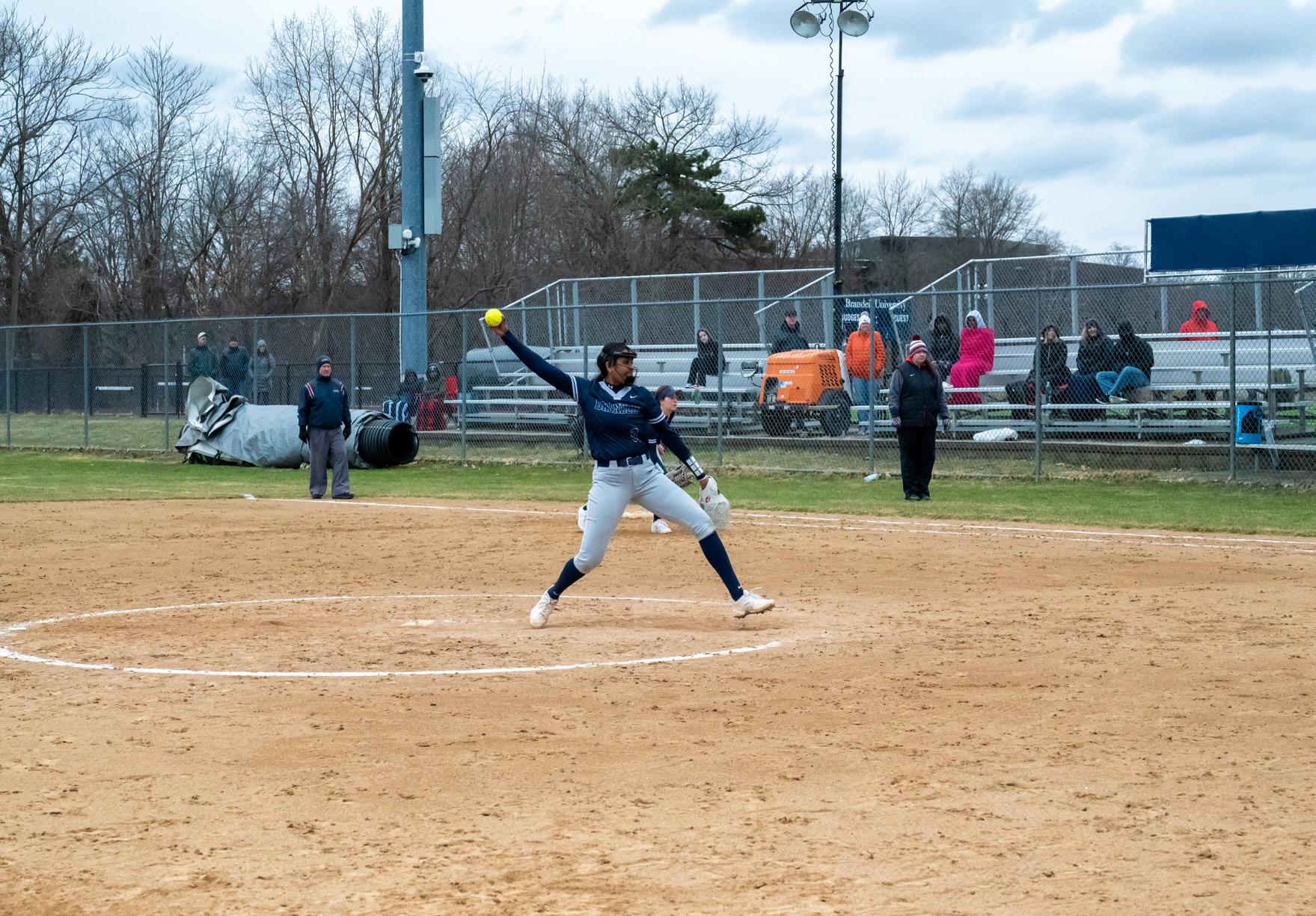
pitchers loved her first class framing ability. Micale will be heading to Hanover, New Hampshire next year where she will be attending Dartmouth University as a part of their doctorate program for biology.
Even though the team narrowly missed the NCAA tournament this year, there are good things on the horizon for them. Finishing 25-13, they were one of the best teams in their region — maybe in all of New England. Building on this season’s momentum, Coach Bishop will have her eyes set on big goals for next year.
CELTICS: MVP Embiid sent home by Celtics
CONTINUED FROM 14
seven. In the post game press conference of game six, Brown challenged Celtics fans to bring it all for the final game of the series: “Game seven, I expect — if you're there, or if you're not there, if you're in your home, if you're watching at a bar, if you're watching down the street at a friend's house, I don't care. I need you to be up, I need you to come with the energy, because we're gonna need every bit of it.” The challenge was not taken lightly by the fans.
At the start of game seven, TD Garden was rocking. The announcers struggled to compete with the atmosphere in the stadium. Brown’s challenge to the fans looked like a success. The first quarter felt disappointing compared to the energy of the crowd, and the 76ers took a 2923 lead entering the second. During the second quarter, the tide of the game began to shift towards Boston: the Celtics held a narrow three point advantage heading into halftime. Something must have happened in the Celtics locker room during The halftime break, because the third quarter was something out of a movie. Tatum, who had been playing a very respectable game up till this point, came out of the break on a mission — he connected on 17-28 shots from the field, scoring 51 points, and added 13 boards with five assists. Tatum’s masterclass set an NBA
record for the most points scored in a game seven performance. Veteran big man Al Horford shut the reigning MVP down, allowing Embiid to score just 15 points in the winner-take-all match-up. Embiid’s partner James Harden only managed to score nine points.
A 33-5 run in the third quarter set the Celtics up for a commanding 11288 victory. Tatum exited the game in the finals minutes and received thundering “MVP” chants from the crowd. Smart called Tatum’s performance a “movie” — a movie that will be a horror flick for Philadelphia fans for years to come.
In the other Eastern Conference semifinals, the Miami Heat defeated the New York Knicks to advance to the finals as the eighth seeded team. Miami’s upset against the Milwaukee Bucks put the league on notice, and they will have to travel to Boston to kick off the conference finals series. If the energy and intensity can stay high in the Garden, it will be hard for any opposing team to succeed against the Celtics.
Tatum has placed himself in elite company with this performance but the goal hasn’t changed: winning it all. After a tough Finals series last season, the Celtics are hell-bent on returning to the NBA’s biggest stage and finishing the job.
BRANDEIS: Shealy and Dienstag claim award night's biggest honors
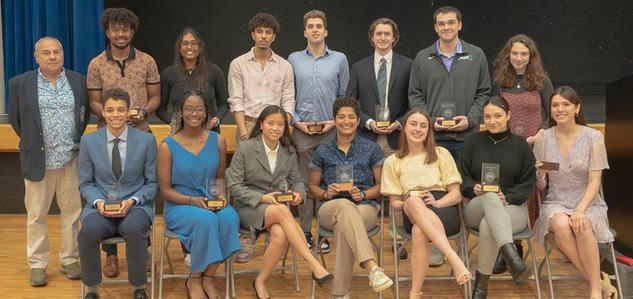
CONTINUED FROM 14
point scorers in program history, she will look to break the record in her graduate year next winter. Off the court, Marchese earned all-district honors for her academic success. She also served on the Student Athlete Advisory Committee; interned for the Office of Diversity, Equity and Inclusion; writes for The Hoot, and serves on the Student Union board.
The fifth and final Athletic Director’s Award went to Emma Reavis ’23, also of women’s basketball.
Emma has been one of the school’s best ever playmakers, a star player since her first year. She led the CitiBrandeis mentorship program, was a part of the Student Athlete Leadership Committee, and worked many jobs in the athletic department.
Arianna Jackson ’25 was presented with the Morrie Stein ’58 Award of Valor for demonstrating courage both on and off the playing field. Despite suffering an injury in her first year, Arianna made a resilient push through, making it back this season. She was one of the team’s best players, featuring in every match but one, and was a significant leader off the court in many different organizations.
The Martin Zelnik ’61 Award was presented to Dion Morris Evans ’23 of men’s track and field, for a non-recruited athlete that made a significant contribution to a varsity team. Morris-Evans walked onto the team his first-year, and has been a committed member of the team as well as one of their top performers.
Another track and field award went to Victoria Morrongiello ’23, the captain of both the women’s cross country and track and field teams. She was awarded with the Morris Sepinuck Award for an athlete with outstanding sportsmanship who also
contributed to the athletic program and campus life. She led cross country to third place in regionals, narrowly missing out on the NCAA championships for indoor track and cross country. She also carried an outstanding GPA, was an editor-inchief of The Hoot, and worked in many other organizations at Brandeis.
The Charlie Napoli ’58 ScholarAthlete Award was awarded to student athletes on the men’s and women’s side that have excelled in the classroom and in athletics.
The men’s winner was Ryan Power ’24 of men’s basketball. Ryan was a force on the court, and one of the team’s most important players. Off the court, he has a 3.83 GPA and is an academic all-district honoree.
The women’s winner was Bailey Gold ’23 of women’s swimming and diving. She has earned team MVP in all four years in the pool, reaching UAA championship finals every season and setting many school records along the way. Out of the pool, Bailey has carried an incredible 3.97 GPA as a double major in psychology and neuroscience, serving on the Student Athlete Advisory Committee, working for Advocates for Health and Waltham Against Dementia, and serving as a teaching assistant in the physiology lab.
Lev BenAvram ’26 and Ragini
Kannan ’26 were honored with the newest award: Rookies of the Year. BenAvram won a gold medal at his first-ever collegiate tournament, leading the men’s team with 39 wins in dual matches and pioneering a dominant sabre squad. He also competed in the National Championships in Duke, as well as with the United States Fencing Junior World Championship team in
Bulgaria.
Kannan was one of the best pitchers in the UAA this season, recording a 2.02 ERA with 132 strikeouts. She was one of three softball firstyears to receive All-UAA first team honors. Brandeis Softball had a very successful season, finishing 25-13 and narrowly missing out on a bid to the NCAA tournament. The future looks very bright for the softball team with Kannan on the mound.
Maggie Shealy ’23 and Sam Dienstag ’24 were honored with one of the biggest awards of the night: the Max I. Silber Award and the Harry, Joseph and Ida Stein Award. These awards are given to the best athletic performers of the year.
Shealy, who was named the Division III sabre fencer of the year last year, completed another extraordinary season, highlighted by her bronze medal at the NCAA National Collegiate Fencing Championships at Duke University. She broke school records along the way and competed for Team USA in France, Greece, and South Korea. Dienstag was absolutely unbelievable in the pool this year for the Judges, claiming All-American status. He finished 13th in the 500 and fourth in the mile. His times were so solid that Brandeis ended up as the 25th best team in NCAA due to Dienstag’s performance. Dienstag broke multiple school records this year and still has another year to keep doing it.
This banquet highlighted some of Brandeis athletics’ very best, both on and off their respective athletic arenas. Congratulations to all those who won, and thank you for representing Brandeis at the highest level.
SENIOR SEND-OFF
FINAL FAREWELL: Brandeis Softball seniors say goodbye to the diamond as they look to life after Waltham.
BEST
OF THE BEST: On May 4, various Brandeis student athletes were honored at the Michael Coven Awards Banquet.
13 TUESDAY, FEBRUARY 14, 2023 ● SPORTS ● THE JUSTICE
Photo courtesy of BRANDEIS ATHLETICS
ELIZA BIER/the Justice
THE JUSTICE ● SPORTS ● MONDAY, MAY 22, 2023 11
Sports just
Tatum and Celtics advance to Eastern Conference Finals
■ After trailing 3-2 in the Eastern Conference semifinal series against the Philadelphia 76ers, the Boston Celtics completed the comeback and advanced to the Conference Finals.
 By AIDEN GUTHRO JUSTICE EDITOR
By AIDEN GUTHRO JUSTICE EDITOR
In sports, there are certain moments that will be remembered forever — they are imprinted on the minds of those who can understand the gravity of the situation. Celtics player Jayson Tatum’s game seven performance against the Philadelphia 76ers in the Eastern Conference Semifinals may just become one of these immortal moments — a moment that will live vividly in the minds of all Boston fans.
After putting together one of the worst performances of the year in game five, the Boston Celtics looked like a shell of their regular season self. Holding a 3-2 series lead and heading back to Philadelphia for a series-clinching match-up, MVP Joel Embiid and the 76ers looked poised for an Eastern Conference Finals appearance. However, the Celtics were not ready to roll over and concede to their rivals. Just as they
have done all season long, they found a way to regroup and compete in the midst of chaos.
In game six of the series, the two teams were evenly matched — trading buckets and leads throughout the entire game. Tatum, who was a serious MVP candidate for a majority of the season, only notched three points through the first three quarters of the game. Frustrated with his performance on the offensive end, Tatum looked to be a menace on the defensive side of the ball, grabbing nine rebounds and rejecting a pair of shots. But as the law of averages dictates, Tatum was due for a hot streak, and he found it at the perfect time: the fourth quarter. As the game winded down, Tatum’s poor shooting woes turned around and he went off for 16 points in the final minutes of game play.
Marcus Smart and Jaylen Brown were able to take the offensive pressure off Tatum for the majority of the game. Smart was the serious game-changer in game six — his 22 points and full effort performance spurred the team to victory. Brown has been a consistent pillar all season long and tallied 17 points, four assists, and six rebounds in the match-up.
Brown was recently named second team All-NBA, and his performance throughout the playoffs has done justice to this recent title. Tying the series at three games a piece, the two contenders were headed back to Boston for a highly anticipated game
See
Brandeis’ best recieve awards at Michael Coven Award Banquet
■ On May 4, many Brandeis athletes were honored with various awards at the Michael Coven Awards Banquet.
By JOSH GANS JUSTICE STAFF WRITER
As the 2022-23 school year comes to a close, the Brandeis student athletes were honored at the annual Michael Coven Awards Banquet on May 4.
The ceremony was opened by Director of Athletics Lauren Haynie, followed by touching speeches by Morgan Clark ’23 of women’s soccer and Asher Kaplan ’23 of baseball.
The first award was the Athletic Director’s Award, presented to five Judges that demonstrated excellence in representing the department in and out of the sport.
The first winner of this award was Rani Balakrishna ’25 of softball. On the field, she was a leader. Though much of it was from the dugout, Rani’s leadership proved vital in the
team’s success this season. Off the field, she made an even bigger impact.
A writer for the Justice, she wrote an op-ed arguing for gender equality and raising awareness in the Brandeis community.
The second winner was Benton Ferebee ’23 of the men’s swimming and diving team. A fifth-year, Benton was certainly successful in the water, breaking multiple school records and captaining the team for two years. He has also played a significant role in athletics, supporting the strength and conditioning program, working as a lifeguard, and being a vocal advocate for mental health in athletics.
The third winner was Gabe Haithcock ’25 of men’s soccer. He has been a true leader on and off the field, as the founder and president of Student Athletes of Color and vice president of the Student Athlete Advisory Committee. Gabe has provided incredible support in tackling the biggest issues facing Brandeis athletics and beyond.
The fourth award went to Franchesca Marchese ’23 of women’s basketball. Among the top three-
MICHAEL COVEN AWARDS BANQUET
Brandeis honored various student-athletes at the 2023 Michael Coven Awards Banquest on May 4, pg. 11.
Brandeis Softball misses out on NCAA tournament appearance
■ After
season, the Brandeis
team narrowly missed
return to the NCAA tournament.
By AIDEN GUTHRO JUSTICE EDITOR
Many teams on the Brandeis campus did not have as good a season as the Brandeis Softball team did this year. Finishing second in the University Athletic Association, the team exceeded expectations. While Case Western Reserve University ran away with conference play, the Judges took care of business as well, taking series wins over New York University, Washington University in St. Louis, and Carnegie Mellon University. With a rare combination of veteran and youth talent, it was hard to pinpoint how this team would perform while relying on first-year players to step up. However, it turned out that the first-year talent would be the main storyline of the season. Of
the team’s four All-UAA selections, three of them were first-years — Ragini Kannan ’26, Erin Hunt ’26, and Maddie Manes ’26. Kannan was a force to be reckoned with on the mound, finishing the season with a 2.02 ERA and 132 strikeouts. With these elite statistics, Kannan has already joined the ranks of some of Brandeis’ best pitchers to date.
Hunt was a pillar of stability for the line-up. Batting leadoff and playing centerfield, Hunt was often an unsung hero of games. Hunt batted a ridiculous .391 with an on base percentage of .458 — her consistency at the plate made her an obvious choice for leadoff batter every game this season. In the field, Hunt was one of the best defensive players on the diamond. She routinely made spectacular catches, and often caught runners trying to push for extra bases. Hunt will be a major player for the Judges for years to come.
Manes was a superb first basewoman, and her hitting didn’t disappoint, either. Going .333 at the plate with 24 RBIs and two home runs, Manes was one of the most feared hitters in New England. At first base, Manes looked like a
natural, making even the hardest plays look simple. Head coach Dani Bishop will enjoy having these hard working players on her team for the next three years.
However, with the end of every season comes a senior class that the team must bid farewell to. This year Jamie Pippin ’23, Lily Medici ’23, Chandra Penton ’23, and Sophia Micale ’23 are saying their final goodbyes to the diamond. Pippin, a Washington state native and captain of the team, will be returning to Brandeis to pursue a master’s degree at the International Business School. During her time with the team, Pippin played all over the infield — first base, second base, and shortstop. Her leadership and willingness to help the team however possible will be sorely missed.
Medici has been a must-start right fielder for the Judges since she stepped on campus in 2019. Not the loudest voice on the team, Medici’s presence was a calming one on the field. She was a difficult batter for opposing pitchers as a lefty with surprising power in her swing. Medici will be pursuing veterinary school at the conclusion of her
BLEEDING
The
the Philadelphia
to advance to the Eastern
BANNER 18
having a great regular
Softball
a
GREEN:
Boston Celtics outlasted
76ers
Conference Finals.
CELTICS
See SOFTBALL, 13 ☛
BRANDEIS
CELTICS, 13 ☛
See BRANDEIS, 13 ☛
Monday, May 22, 2023 Page 12 Waltham, Mass.
SOFTBALL
Photo courtesy of CREATIVE COMMONS
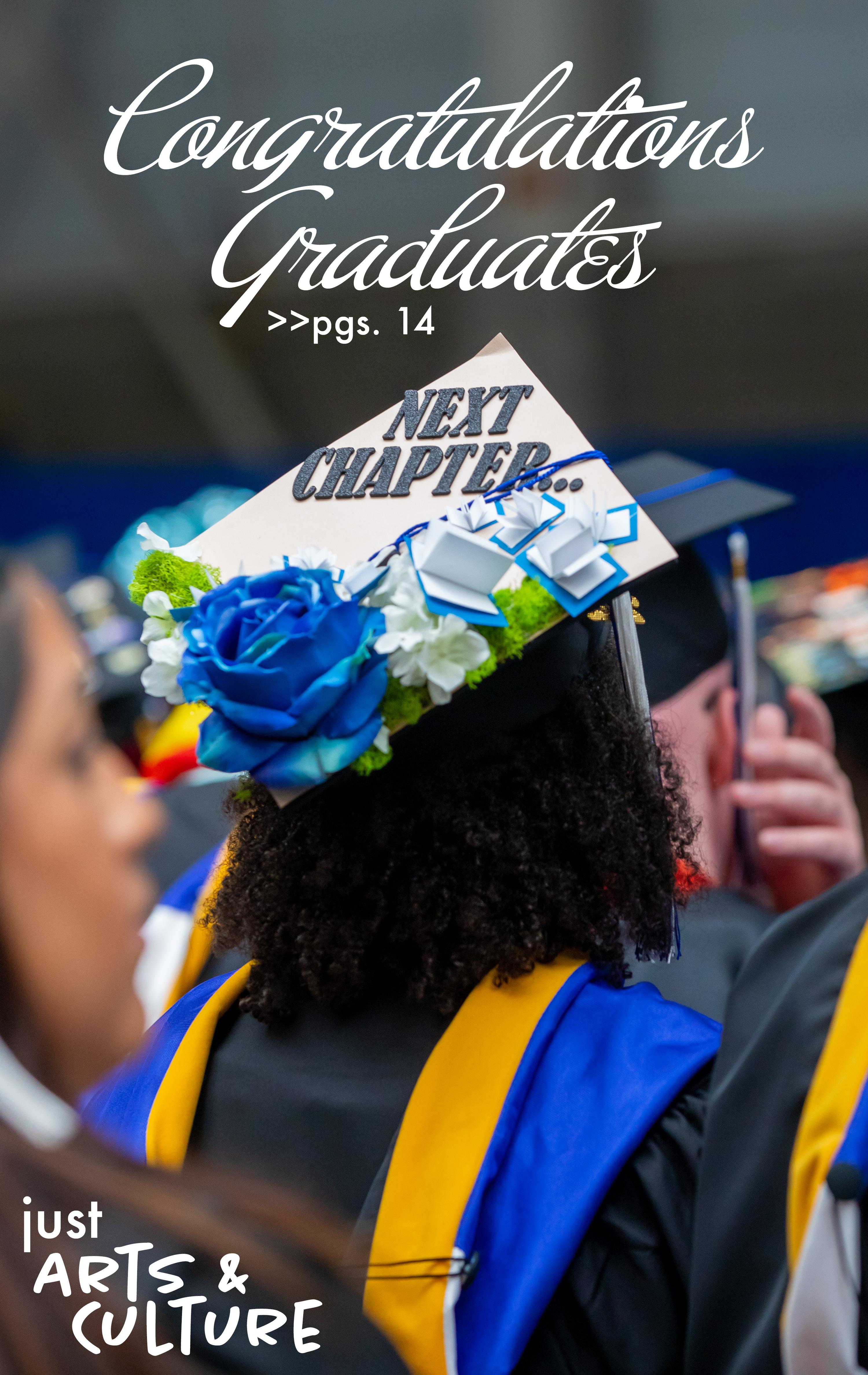 Photo: Smiley Huynh/the Justice. Design: Smiley Huynh/the Justice.
Photo: Smiley Huynh/the Justice. Design: Smiley Huynh/the Justice.
May 22, 2023 Vol. LXXV #22
Waltham, Mass.
COMMENCEMENT CELEBRATES A NEW CHAPTER
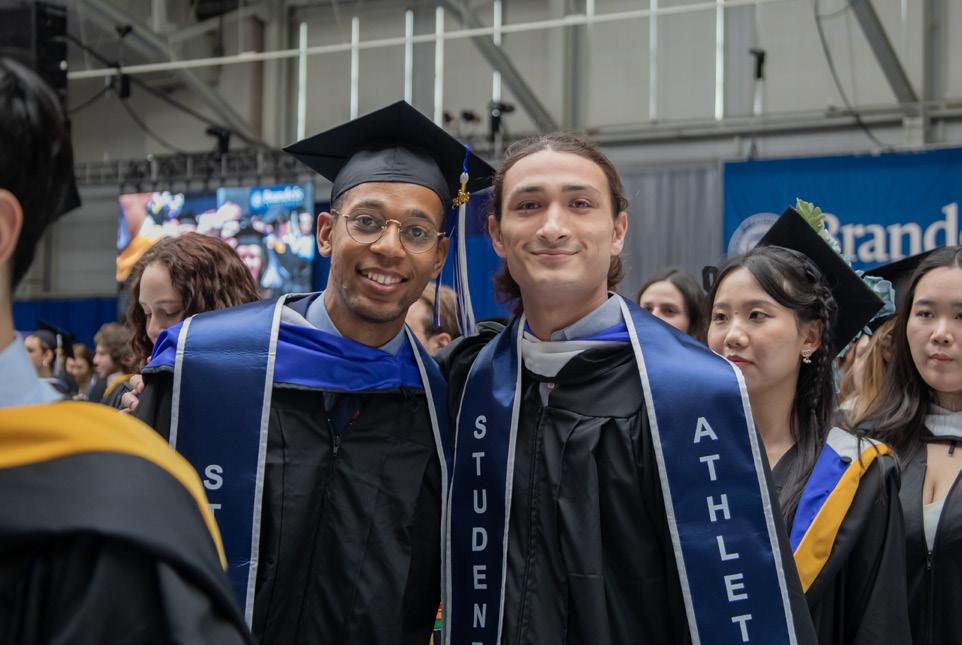
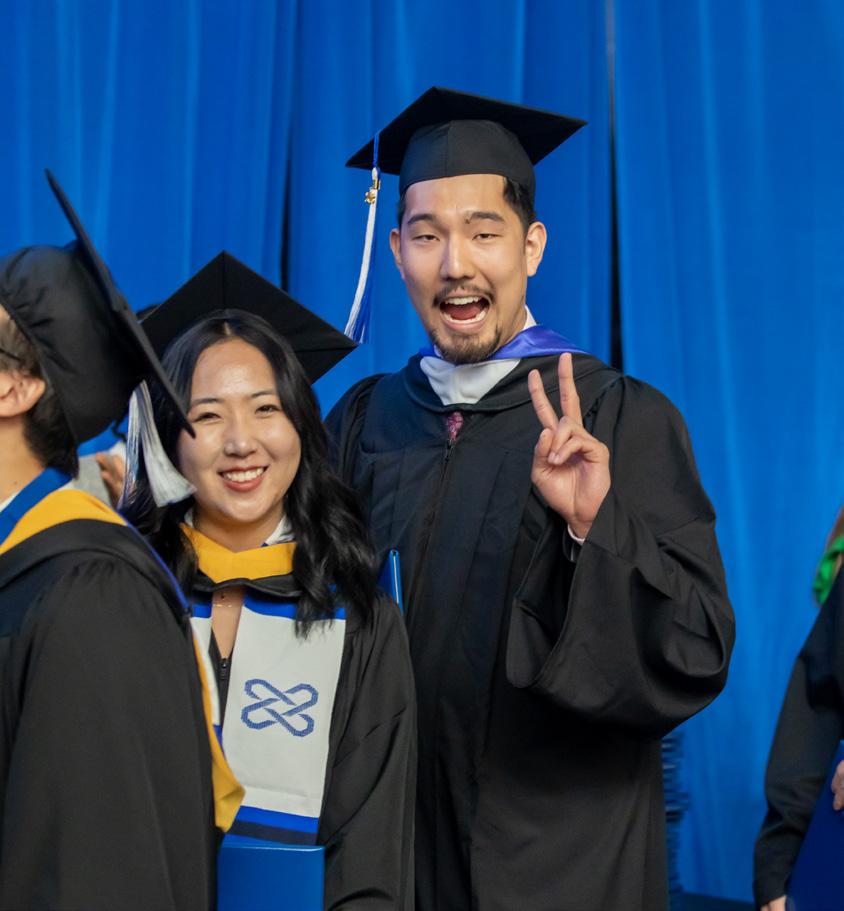
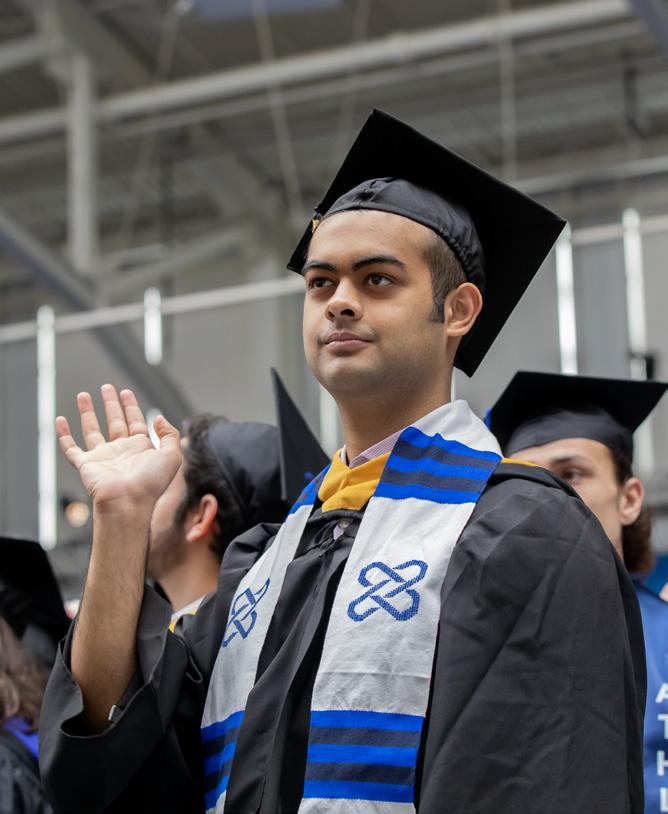
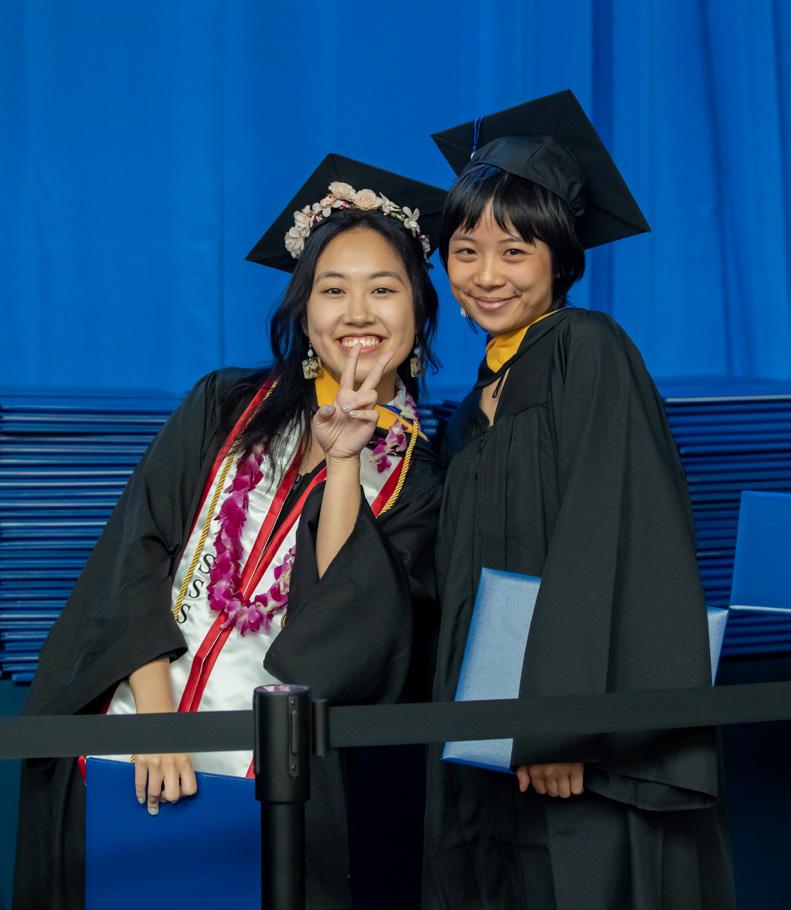

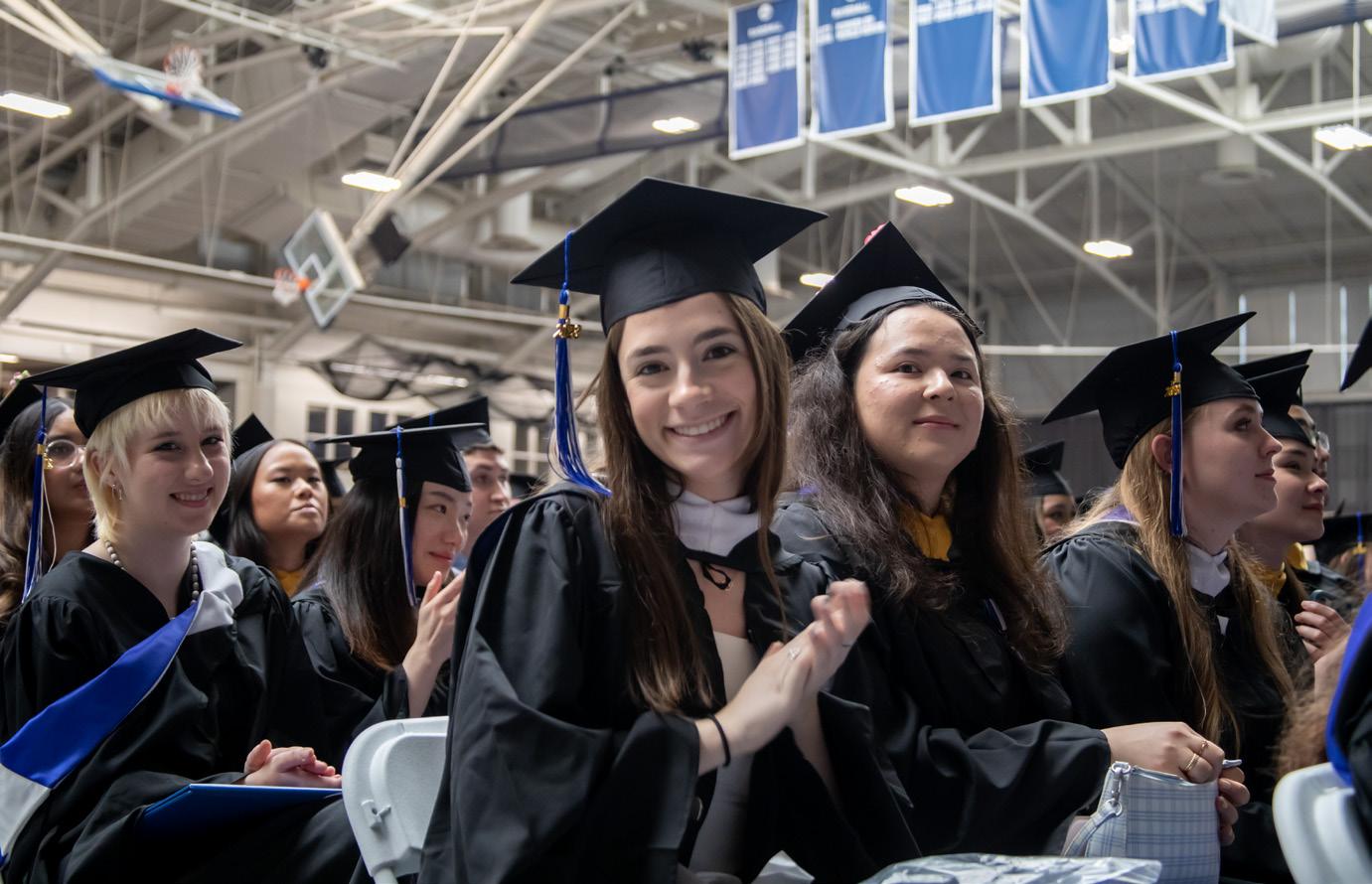



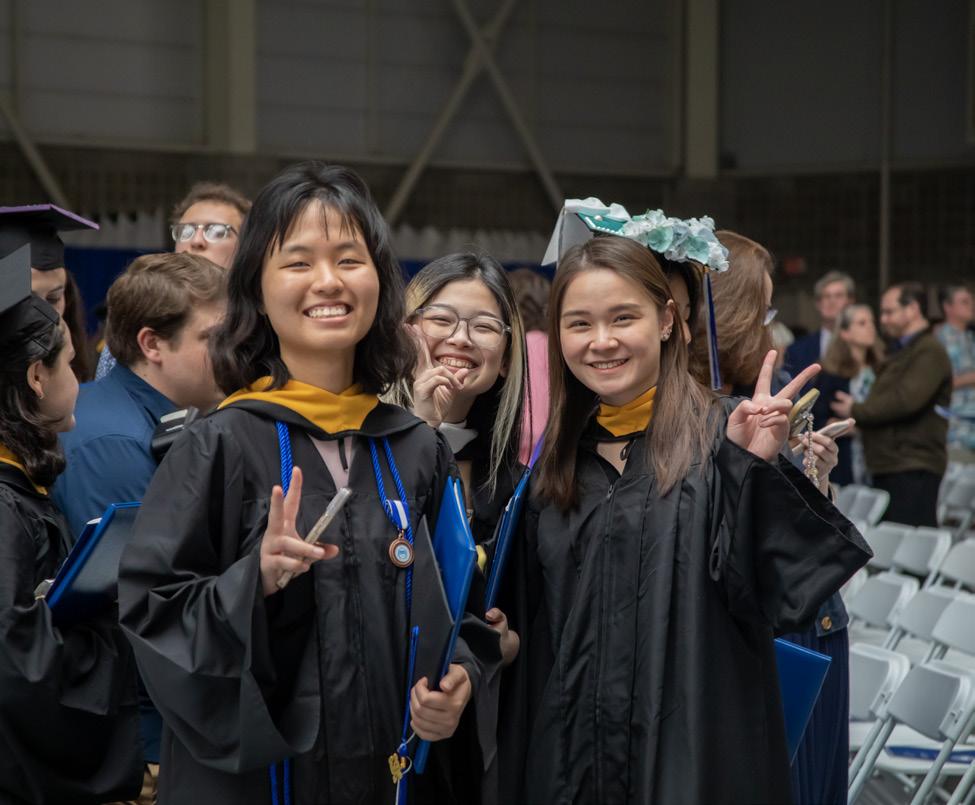
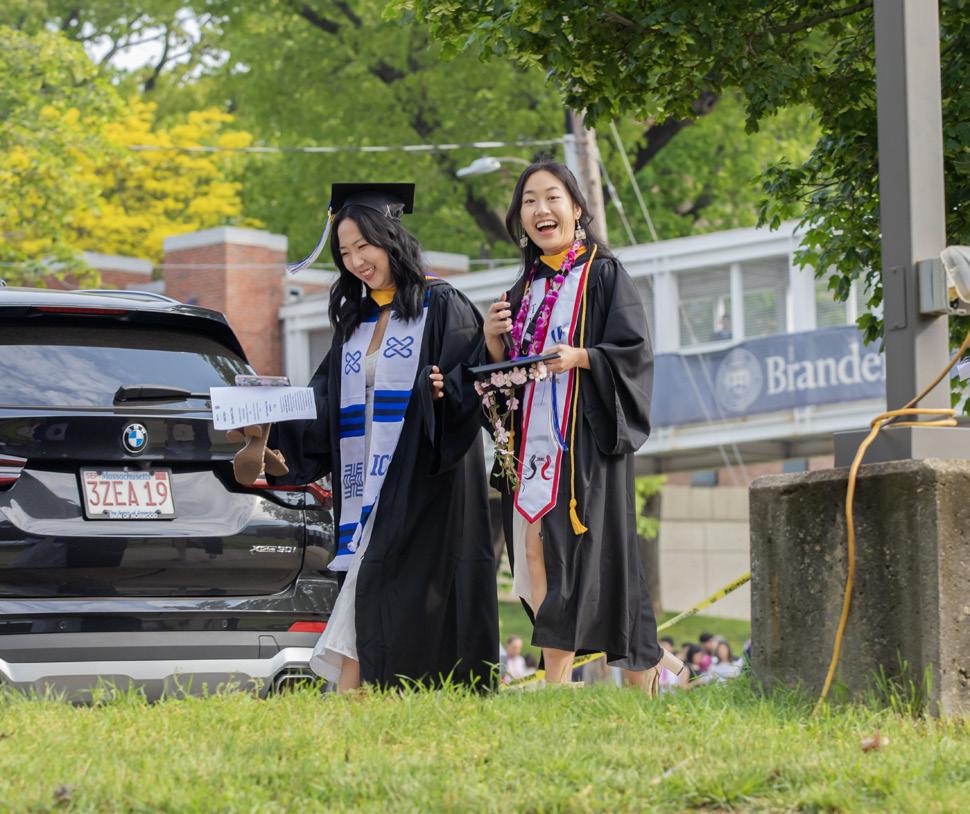
 By SMILEY HUYNH JUSTICE EDITOR
By SMILEY HUYNH JUSTICE EDITOR
THE JUSTICE | ARTS | TUESDAY, JANUARY 31, 2017 14 MONDAY, MAY 22, 2023 I ARTS & CULTURE I THE JUSTICE
COMMENCEMENT
Photos: Smiley Huynh. Graphics courtesy of CREATIVE COMMONS. Design: Smiley Huynh/the Justice
MONDAY, MAY 22, 2022 I ARTS & CULTURE I THE JUSTICE
Poetry plays such an important and instrumental role in so many lives around the world including mine. From the young age of nine I enjoyed reading Maya Angelou and Robert Frost; however, I was unsure how to continue my relationship with poetry in a more tangible way. I started writing poems during the pandemic as my own way to look at society and process issues that America was reckoning with. On a fall day of my first semester at Brandeis, I searched relentlessly for a poetry club — to no avail, because one did not exist.
TV REVIEW
Luckily, this fall’s involvement fair will host Brandeis’ first poetry club called the Brandeis Organization of Poets, best known as BOOP.

Greg Roitbourd ’26, one of the founders and writing coordinator, fell into poetry and songwriting particularly during the pandemic. Despite being a triple major in physics, creative writing, and theatre arts, he really enjoyed poetry and wanted to create a community at Brandeis for others who are also passionate about reading, enjoying, and creating poetry. He first had the idea in fall of 2022, so he created an interest form and had flyers posted around campus. Surprised with the level of interest in a poetry club, he began to assemble a team.
“I saw people that I knew well enough that I could trust them with a club,” Roitbourd said in an April 23 interview with the Justice. “It was like my little baby.” He added that he wanted a non-hiercharal e-board, instead promoting a collaborative team of students committed to the club. The team consists of four other students serving on the executive board aside from Roitbourd: writing manager Mor-
gan Collens ‘26, reading coordinator Maddie Leventhal ’26, reading manager Sam/Caden Daubon ’26, and outreach coordinator LaRue Vigil ’26. Roitbourd shared that although BOOP is not an official club at Brandeis, it is very much thriving. The Instagram account, @brandeis.boop, has already amassed over a hundred followers, with a lavender aesthetic that is present through each post.
In a May 4 interview with the Justice, Leventhal shared her personal experience with poetry as an appreciator, not creator. Leventhal explained that “poetry is such a powerful experience.”
She prefers to be behind the scenes with the club, serving as public relations and writing manager. She described BOOP as unconventional: “We are a community and gathering space.” BOOP, like many clubs, requires a lot of work to build their community, including e-board meetings, researching poems and poets, and putting on events. In collaboration with the Brandeis Library, BOOP hosted their first open mic night on April 23 in celebration of National
Poetry Month. Students took turns sharing their own poetry, as well as poetry created by others. Both Roitbourd and Leventhal agree that not only has social media revived poetry, but poetry is something that will never die despite its record of being unpopular. “We run the risk of all literature becoming a dying art. Social media has definitely [allowed] a resurgence of poetry, but poetry is a suffering art form, not a dying art form” Leventhal passionately shared. Roitbourd said, “I think poetry is an artistic way to connect with the world and has been around so long that it will continue to thrive.”
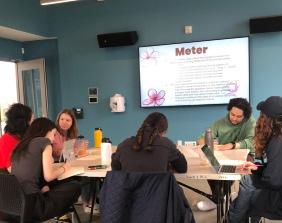
poetry as well as the skill of metaphors and symbolism. His favorite poet is Shel Silverstien. Leventhal enjoys all forms of poetry, including spoken word and especially confessional poetry. “Poetry is a relief and a way to express words that cannot be expressed in another way. It does not simply have to be words on a page,” Leventhal added. She said one of her favorite poems is “I’m not a religious person but” by Chen Chen, and her favorite spoken word poem is “Untitled” by Staceyann Chen. As for the future of the club, BOOP plans to incorporate collaborations with other clubs, as well as field trips and writing sessions at sunrise or sunset. I am very excited to see all that the Brandeis Organization of Poets does next.
By KENYATTA DAVIDS
JUSTICE CONTRIBUTING WRITER
I’m a big fan of Donald Glover’s “Atlanta,” so I was ecstatic to see the trailer for “Swarm” with Dominique Fishback as the show’s lead. After watching it, I wasn’t disappointed. Everyone in the show had striking and real performances that made the tale believable. But before I dive in, be warned: there are spoilers ahead!
Andrea, or “Dre” (Dominique Fishback), is introduced to the audience as a socially awkward recluse obsessed with the popstar — and Beyoncé euphemism — Ni’Jah (Nirine S. Brown). Dre is the personification of the weird, quiet girl in the corner with no friends. She and her adopted sister, Marissa (Chloe Bailey), bond over Ni’Jah’s music, promising they’ll see Ni’Jah in person one day together. For Marissa’s birthday, Dre buys tickets to Ni’Jah’s concert to fulfill their dream. Yet, Marissa decides against going to the Ni’Jah concert with Dre to escape with her new boyfriend, Khalid (Damson Idris), and it’s through Khalid the idea of invisibility is introduced.
Khalid takes Dre’s awkwardness around him as an indication of interest. He tries to make a move on her, kissing her, but Dre rejects him out of respect for her sister. To Khalid, Dre is a young, naive virgin he can easily get along with. He reduces Dre to an object of untouched youth and a sexual adventure, denying her individuality. Dre’s invisibility in Khalid’s eye infects Marissa. After Marissa’s initial rejection, Dre tells her that Khalid tried to make a move on her at her job, but Marissa incredulously stares at her and scampers off to Khalid’s dingy car. She doesn’t see Dre as her sister, but rather as a nuisance in the way of her love. Marissa was the person in Dre’s life who constantly loved her for her, but that love is
less consistent now that she is en-
amored with Khalid. Marissa was Dre’s best friend who valued and saw her — her best friend she is now invisible to.
The disconnect between Marissa and Dre pushes Dre into an ocean of insanity. Dre decides to go to the Ni’Jah concert alone, where her phone dies. She has a one-night stand and awakes in the guy’s bed the next morning. When Dre charges her phone, Dre sees Marissa has tried to call her numerous times, followed by various frantic texts and videos. It turns out Khalid cheated on Marissa and Marissa needs Dre, whom she could not contact. Dre frantically returns home, finding Marissa without a pulse and overdosed on pills. She killed herself out of heartbreak because of Khalid’s infidelity, which Dre had tried to warn her of. And at this point, Dre self-baptizes in the ocean of insanity. After Marissa’s funeral, she visits Khalid’s house, bludgeoning him to death because he “killed” Marissa. She then eats a pie from Khalid’s fridge with blood-caked fingers, compulsively gorging. It is revealed to the audience that Dre suffers from an eating disorder and that junk food is a tool for dissociating from her reality.
She then goes on a road trip, breaking into and entering a man’s room where she sees VIP backstage passes to get into a Ni’Jah concert and an after-party. She finds out that the pass belongs to George Clement (Byron Bowers) and manipulates him into a situationship with her, thus using him to get up close and personal with Ni’Jah. Her parasocial relationship with Ni’Jah is, again, a demonstration of invisibility. Ni’Jah has no idea who Dre is; Dre is just one fan among a mass of people who idolize Ni’Jah. However, Dre goes further than the average fan-girl. Sheseeks her idol for self-fulfillment — to feel alive and recognized.
Dre’s parasocial fantasy fuels her to the point of delusion. She locks George in a freezer, using his pass to sneak into Ni’Jah’s afterparty. This delusion viscerally warps Dre’s mind at the after-party. Approaching Ni’Jah, she hallucinates biting into a plum, when in reality, she bites into Ni’Jah’s chin. After realizing what she did, Dre flees the scene, disoriented and staggering. The next day, Dre wakes up to her social media feed flooding with Ni’Jah fans threatening the assailant who bit Ni’Jah. The media transforms Dre into a monolith where she’s “that b**ch that bit the Queen.” Her identity is robbed and reduced to a single story of this crazed person who harmed their idol. The same community she saw herself deeply intertwined with doesn’t see her as
one of them anymore, but as an outsider: invisibility in isolation. With the media uproar, Dre’s homicides are catching up with her, for a detective named Loretta Greene (Heather Simms) thinks Dre is the next big serial killer. She has lots of evidence of documentation for her case on Dre, and she portrays Dre as a poster child for a Black woman gone mad. Greene makes a spectacle out of Dre’s downward spiral to bolster her reputation as a detective and get her “big break.” Dre is painted as a one-dimensional psychopath, and the narrative of Dre being a troubled girl is driven home by the testimony of one of her previous classmates. In the documentary, Greene digs up Dre’s adolescent years, finding one of her former classmates, Gwen Guillory (Lauren Lee). At the start of the interview, Gwen prefaces her anecdote, stating how weird Dre was growing up. Gwen invited Marissa and Dre to a sleepover. During the sleepover, Gwen says Dre thought Gwen was bullying Marissa, and Dre proceeded to stab her repeatedly with scissors. Gwen did survive the encounter, traumatized by the instance, shedding tears at the recollection of the memory. (Gwen was quite obnoxious; I can’t blame Dre for her moral conflicts.) The social isolation Dre goes through isn’t given a platform, just the reaction to another person’s acts; it makes her seem erratic and illogical, fitting the narrative of a crazed serial killer. Dre is more than a detective’s enigmatic case; she’s a person. However, the media’s sensationalization swallows her individuality and paints her as whatever Greene desires.
After biting Ni’Jah, Dre heads to Bonnaroo to go to another Ni’Jah concert. She goes to a gas station bodega, but a police officer trails her to the gas station on his motorcycle. He parks by the front of the gas station bodega, staring daggers at Dre as she side-eyes him through the glass for what can be assumed was her being a Black woman in a white area like rural Tennessee.
A white woman about Dre’s age takes note of this. She gets the cop to go away, later revealing that she threatened to record the cop being prejudiced against a Black woman. The woman, Cricket (Kate Lyn Sheil), invites Dre to stay at her large house with her friends so Dre doesn’t have to live out of her car for the next few days leading up to the Ni’Jah concert.
After arriving at the house, Dre befriends the girls, specifically Eva (Billie Eilish), who sits Dre down and asks her questions about her life. It takes a turn when Eva starts snapping in short intervals, brainwashing Dre into telling her the necessary details of her life.

Dre loses her perception of time in the process. It’s revealed that Dre was part of an accident in which she possibly caused her grandma’s death, or at the very least witnessed it, hauntingly calling the blood “spilled milk.” Food appears here again as a means of dissociation, implying that Dre sees the blood of those she’s murdered as spilled milk rather than what it really is and represents. The image of spilled milk also connotes something minuscule and easy to clean up, which is corroborated by how easily she kills throughout the show. This is one of the rare moments where Dre opens herself up to another individual she believes wants to get to know and understand her. Still, in the end, Eva brainwashes Dre to indoctrinate her into Eva’s Midsommar-esque sisterhood cult.
Objectified as a means to an end — in this case, to become another member of Eva’s cult — Dre is made invisible once again and has her mind breached. It is only upon finding out that she’s been losing her grasp of time that she realizes Eva intended on having Dre miss the Ni’Jah concert. Dre avenges the sisterhood, making Eva and other cult members roadkill, literally running them over with her car that she misses the show and finds her phone’s out of service. Next, Dre returns to her foster home to coerce her foster father, Harris (Leon), and mother, Patricia (Kimberly Ann Parker), into paying her phone bill. She’s met with hostility and a shotgun fire by Harris that she luckily evades. Harris and Patricia admit that they only adopted Dre to cash in the foster care check to pay for medical bills and Harris’ business endeavors. Once again, Dre is reduced to an asset for those around her to exploit; Dre is made to face isolation in a place she and her sister Marissa found camaraderie, a kind of slap to the face that reminds her that she has no home. Harris and Patricia still mourn Marissa, blaming Dre for taking their little girl away. Her sisterhood with Marissa goes unacknowledged, and she’s made a scapegoat for Marissa’s decisions that she couldn’t control. Dre is submerged in the shadow of Marissa’s death, losing value as a person since her life is reduced to how much her foster parents were banking with each check. Dre manages to get away in one piece. There’s a time skip to a couple months later. Dre now identifies as a man named Tony and falls in love with Rashia (Kiersey Clemons), a college student.
The two date for a while, Rashida being the first person after Marissa to see Dre for who he is. She even states that she hates Ni’Jah’s music. Tony doesn’t murder her for it
initially; he embraces it, as he sees that their differences draw them together. The two are happy together, and Tony remains present in his own reality, no longer “spilling milk.” Unfortunately, Tony’s selfish nature reigns; Tony buys Ni’Jah tickets for Rashida’s birthday party like an idiot. Rashida calls him out for inconsideration, and Tony relapses, choking out Rashida and burning her body. He does so out of obligation as a member of the “swarm,” aka a fan of Ni’Jah. This is the one time Tony isn’t invisible and is finally connecting with someone, and his idolization and parasocial relationship with Ni’Jah literally erased Rashida. Ni’Jah is his religion, so Rashida living outside his “belief” in Ni’Jah made him see Rashida as no different than all his prior victims. He comes full circle, doing what was done to him to the one person who cared about him most at this time of his life. He goes to the Ni’Jah concert, having a massive hallucination. Ni’Jah calls Tony to the stage to sing for him, and Ni’Jah’s face transforms into Marissa’s. After singing with Ni’Jah, Tony lays on Ni’Jah’s shoulder in her car, crying tears of gratification. In this warped reality, Tony lives out his dreams with Marissa, fulfilling the promise to meet Ni’Jah face-to-face at one of her concerts. Finally, he’s seen by his idol that he’s worshiped all his life. He imagines Ni’Jah’s face to be Marissa’s because Marissa is the only person he was ever close to in the world who shares his love for Ni’Jah. In the parasocial relationship he conjured up, Ni’Jah understood him. It’s not only a way of honoring Marissa’s dream even though she’s dead but also a way to achieve self-fulfillment and have the person he sees as a god finally value him in return. But, Tony could only find solace in what, in the end, is just a delusion. Dre/Tony is a cautionary tale, allowing their environment to define them. As a result, they live in the confines of their own mind, and the only joy Dre/Tony finds is in fantasies and dreams that never come to be.
Dre/Tony’s trail of self-destruction and external violence tore their life apart, subjugating their identity to invisibility by defining their life only by the idolization of Ni’Jah. Unfortunately, invisibility isn’t just being seen; it’s also never seeing yourself. Ultimately, Dre/Tony never saw themselves and got lost in their imagination.
I recommend this show to all the viewers. It was amazing to watch and experience, and at times kind of entertaining to watch Dre/Tony’s downward spiral as a member of a popstar fandom that paralleled a cult.
Design: Mina Rowland/the Justice
One of Roitbourd’s favorite poems is “Hope is the thing with feathers” by Emily Dickinson, because it expresses the nuance of THE JUSTICE | ARTS | TUESDAY, JANUARY 31, 2017 15
CLUB FEATURE
Presenting the Brandeis Organization of Poets In search of poetic voices
By MINA ROWLAND JUSTICE EDITOR
Invisible: A psychotic take on ‘Swarm’
BOOP: The Brandeis Organization of Poets created a social media presence quickly following its launch.
BOOP: Members write poetry during one of their club meetings. Photo courtesy of the BRANDEIS ORGANIZATION OF POETS
Photo courtesy of THE BRANDEIS ORGANIZATION OF POETS
ACTOR:
Photo courtesy of CREATIVE COMMONS
Dominique Fishback stars in the Amazon series “Swarm.”
STAFF’S Top Ten
By ELIZABETH LIU JUSTICE EDITOR
Top 10 period pain remedies
I know I am not the only one who experiences pain during menstrual cycles. For all of us out there who experience cramps, bloating, and other kinds of discomfort, here is my list of how to find relief.
STUDENT ART SPOTLIGHT
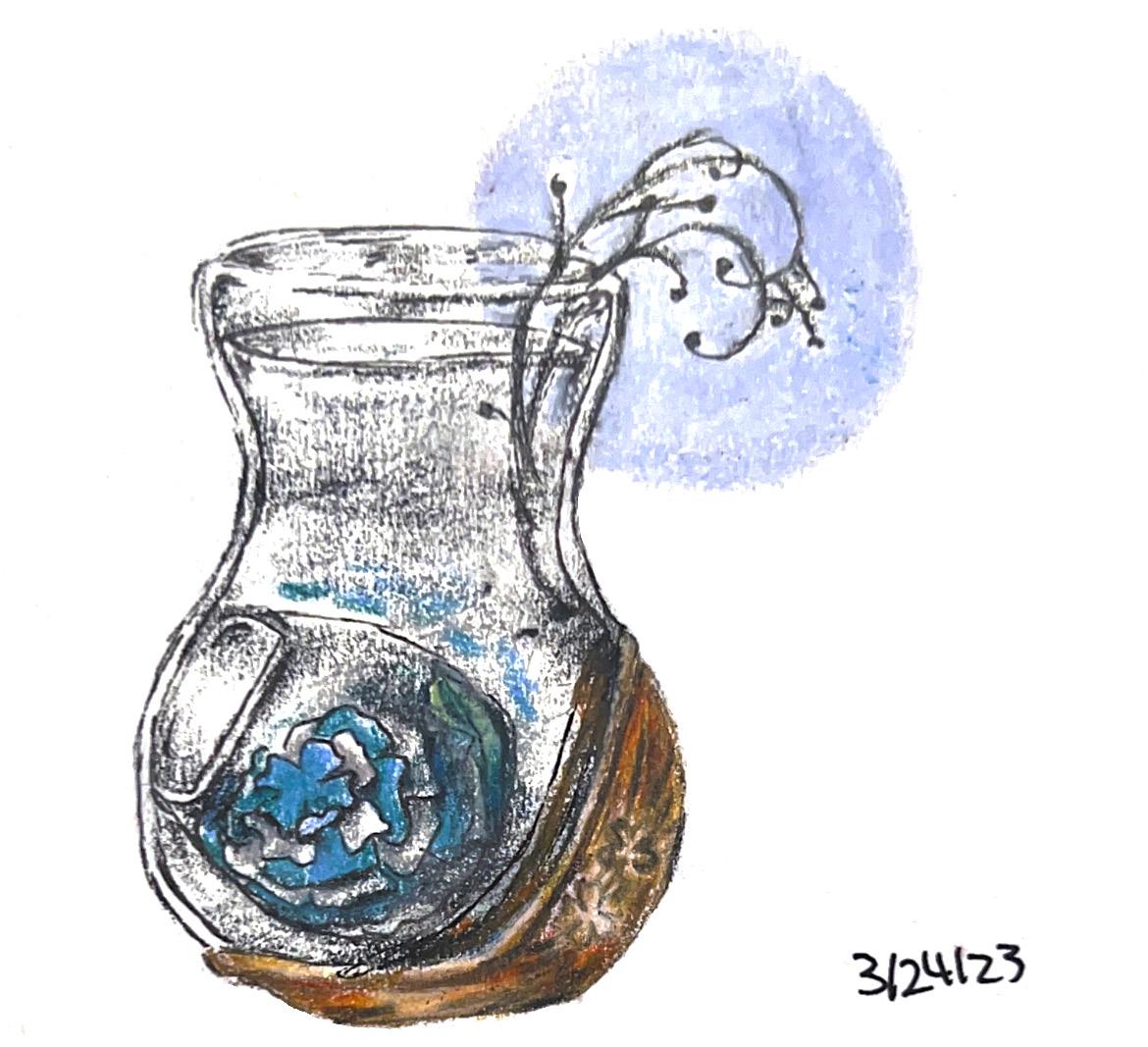
SUDOKU


Megan Liao is a senior illustrator and photographer. No Cap n’ Gown, she ain’t going to school. Her favorite finals week moment was falling off her chair screaming “Eureka!” in the library while working on a paper that was due five hours ago. Her favorite color was cobalt blue, but she thinks she likes turquoise now.

1. Heating pads 2. Sleeping (through class) 3. Sweatpants 4. Painkillers 5. Curling up into a fetal position 6. Soup/tea 7. Comfort foods 8. Binge watching movies/ TV shows 9. Candy/sweets 10. Hugs/emotional suppport MEGAN LIAO/the Justice
MONDAY, MAY 22, 2023 I ARTS & CULTURE I THE JUSTICE
16
ELIZABETH LIU/the Justice
Puzzle courtesy of OPENSKY SUDOKU




 By SOPHIA DE LISI AND ANIKA JAIN JUSTICE EDITORS
By SOPHIA DE LISI AND ANIKA JAIN JUSTICE EDITORS



























 By AIDEN GUTHRO JUSTICE EDITOR
By AIDEN GUTHRO JUSTICE EDITOR
 Photo: Smiley Huynh/the Justice. Design: Smiley Huynh/the Justice.
Photo: Smiley Huynh/the Justice. Design: Smiley Huynh/the Justice.











 By SMILEY HUYNH JUSTICE EDITOR
By SMILEY HUYNH JUSTICE EDITOR






